Our Services
College Admissions Counseling
UK University Admissions Counseling
EU University Admissions Counseling
College Athletic Recruitment
Crimson Rise: College Prep for Middle Schoolers
Indigo Research: Online Research Opportunities for High Schoolers
Delta Institute: Work Experience Programs For High Schoolers
Graduate School Admissions Counseling
Private Boarding & Day School Admissions
Online Tutoring
Essay Review
Financial Aid & Merit Scholarships
Our Leaders and Counselors
Our Student Success
Crimson Student Alumni
Our Reviews
Our Scholarships
Careers at Crimson
University Profiles
US College Admissions Calculator
GPA Calculator
Practice Standardized Tests
SAT Practice Test
ACT Practice Tests
Personal Essay Topic Generator
eBooks and Infographics
Crimson YouTube Channel
Summer Apply - Best Summer Programs
Top of the Class Podcast
ACCEPTED! Book by Jamie Beaton
Crimson Global Academy
+1 (646) 419-3178
Go back to all articles

Homeschooling vs Traditional Schooling: pros and cons
/f/64062/1015x652/a3c0321afb/screenshot-2022-03-02-115354.png)
As a vast majority of the world went remote in early 2020 at the dawn of the COVID-19 pandemic, students had to quickly adapt to remote learning from home. Due to this, many parents began to consider homeschooling for their child rather than return children to their traditional schooling methods. But what are the pros and cons of homeschooling versus traditional schooling?
Homeschooling: the pros
- No commute: Very often, students can only attend certain public schools if they reside in the right district. Alternatively, if they attend a private school further from home, the commute can be long during peak school run hours. As such, homeschooling saves time which can be spent doing further coursework, exploring personal interests, or spending more time with friends and family.
- Tailor-made Curriculum: Although certain states/countries may have specific requirements on what it takes to graduate from high school if homeschooled, the option does give students and their parents the luxury of exploring personal interests, going at their own pace, and taking advanced courses where the student is able to.
- Custom Schedule: The typical 8am-3pm does not have to hold true with homeschooling! While some legal requirements for a minimum number of hours may be present, students are able to have flexibility to pursue other goals such as competitive gymnastics, travel the world with their families, etc.
- Higher performance: According to ThinkImpact, public school students received an average score of 21 out of 36 on the ACT, whereas homeschooled students received an average of 22.8. As for the SATs, homeschoolers scored a nationwide average of 72 points more than their traditional schooled counterparts in the United States in 2020.
- Safety: The risks of COVID-19, school shootings, and other unfortunate situations are minimized at home. The extent of safety will also vary upon the neighborhood the school and home are located in.
Homeschooling: the cons
- Social life restrictions: Students who are homeschooled do not have classmates with them daily. As such, they can be lonely unless a solid effort is made to interact with peers their age through other activities such as attending a church or place of worship, sports teams, community events, etc.
- Pressure on parent’s time: Working a job and raising a child is already a huge time commitment for most adults. As such, being the child’s teacher is an additional burden on parents which not all are able to undertake. Furthermore, a parent will have to ensure that healthy boundaries are set between the parent and child now that the “teacher and student” dynamic is also present.
- Cost: The cost of a homeschool curriculum can be a few thousand dollars, whereas public school is free. However, it should be noted that homeschool can be cheaper than private school, so it is up to a family to decide how to best use their educational budget here.
Traditional Schooling: the pros
- Social life and development: At school, teens get to spend dozens of hours each week with peers their age, thus giving them a platform to develop their social skills.
- Professional instruction: Teachers at schools are qualified, trained professionals who have mastered their craft and in the later grades specialize in their area of instruction.
- Structure: Many children thrive on having a set routine and structure in their daily schedules, and schools are the greatest source of structure in a youngster’s life.
- Extracurriculars: Schools, especially those with a larger student population, tend to offer extracurriculars which a student is not able to acquire at home. Be it being a part of the chess club, trying out for the football team, or running for student government, certain activities cannot be done in a home setting.
- School spirit: Being a member of a school helps develop a youngster’s identity, and students are able to obtain a sense of belonging (provided the school is a good fit for them, of course!).
- Fostering independence: From keeping track of their own timetable (deadlines, bus schedules, etc), purchasing/bringing their lunch, and finding their way from classes, traditional schooling helps build valuable life skills which shall help students once they graduate.
Traditional Schooling: the cons
- More traditional curriculum: Instead of exploring their own interests, students are forced to study subjects at the same pace as their classmates and course selection is more limited.
- Peer pressure: Be it wearing the latest Nike shoes, fitting in with the cool crowd, or dealing with bullies, peer pressure plays a big part of a teenager’s life and is more present in traditional schooling environments.
- Overwhelmed teachers: Many teachers have dozens of students on their roster and getting each student’s individual needs met is not often accomplished.
- Fitting in: Perhaps the school is simply not a good fit for who your child is – be it the type of curriculum offered, the crowd present, or the overall management of the school.
While these are just a few of the pros and cons seen in traditional schooling vs homeschooling, I would like to remind you that there is no direct answer as to which option is better. A family needs to consider their own needs to make this decision, including their time, teaching capabilities, educational budget, location, future goals, and resources. Here at Crimson we are always happy to discuss these options and also work together to advise a hybrid model if necessary – where students may take some courses outside of school in addition to the courses in their regular schooling. The pandemic has made more families consider homeschooling after seeing how their child has been handling remote learning – but before you jump the gun, make sure to consider all the pros and cons thoroughly!
Your friendly neighbourhood Rise blogger,
Learn more about Crimson Rise’s strategic mentorship, academic support, and extracurricular coaching for young students, and request a free consultation on your child’s journey!
More Articles
How to show intellectual curiosity on your top college application.
/f/64062/800x450/e67c57a473/library.jpg)
Best Senior Project Ideas for High School Students + 42 Real Student Examples
/f/64062/1920x800/5aeb0da0d9/senior-project-ideas.jpg)
What Do Top Colleges Look For? Exclusive Insights From A Former Admissions Officer
/f/64062/800x450/0a349379ad/how-to-stand-out-to-colleges.jpg)
Homeschooling Vs Traditional Schooling
This essay will provide a comparative analysis of homeschooling and traditional schooling. It will discuss the advantages and disadvantages of each educational approach, covering aspects such as academic outcomes, socialization, curriculum flexibility, and parental involvement. The piece will explore the growing trend of homeschooling, its legal and practical considerations, and how it compares to the traditional school experience in terms of preparing students for higher education and the workforce. You can also find more related free essay samples at PapersOwl about Family.
How it works
Education is of vital essence in our world today, with most focus directed to making sure all individuals get access to education. Many parents are putting a lot of effort in getting the best education for their kids, as long as they can afford so that they can be successful. One of the most controversial topics in education today is whether traditional schooling or homeschooling is better and if both are equals. Many people have argued against homeschooling because of variety of reasons.
For most parents, traditional schooling is the norm for the society, although some have different views and prefer homeschooling. They are the best way for the future as it provides student centered education, that is adaptive to the needs of the students. This paper seeks to discuss on traditional and homeschooling, and while both have a main goal of producing the best performances, they quite differ in terms of meeting the child’s needs, the learning environment, physical activities, and the aspect of socializing.
Traditional schooling is the oldest educational system that has preferences to homeschooling by some people. The traditional schooling is also termed as public schooling, and the cost for learning here are much less compared to homeschooling. This is because the government pays most of the tuition fees, and the parents are left with little responsibilities like buying uniform’s and maintaining their kids. This kind of education system favor’s all the children from humble and rich backgrounds. Besides that, in public schooling, the level of student socialization is high. The children meet with many kids from diverse background from all parts of the region. From this, they get to know and interact with each other, although their cultural and languages differ. In addition, public schooling sponsors most of extra-curricular activities like sporting, club, and participating in bands, that widens the experience of the kid, making them grow healthy and with enough confidence.
Every child learns, listens and watches different concepts differently (Lips, 2008). Not all of them learn at the same pace. Considering this, homeschooling can be the best as it has many benefits. One of the benefits is; there is a child-based curriculum, tailored to specific needs of the child. This curriculum captures the interest of the child, like for instance, if the child is interested in farming or engineering, they would only be thought specific subjects. In farming, mathematic subject can be thought since there are some calculations like determining the area of land and how much crop can be planted. Traditional schooling on the other hand has one curriculum per class, and the ratio of students to teachers can vary greatly. Some of the students in this curriculum can lose focus easily as they are not drawn to the system. Which if the students could have the curriculum designed specifically to them, they might have a better enjoyment and focus to their education leading to more academic achievements.
Another main factor in learning is the type of environment. The environmental settings can have a great influence to the education of the child and their academic achievements. In comparing the two educational systems, it is evident that pubic schooling could have much more distractions compared to homeschooling. For instance, social peers and popularity contests can bring many distractions to the full potential of the child. For this reason, there is a rise in homeschooling as the parents have increased concerns of their children’s welfare, like peer pressure, academic quality, and violence. Children in homeschooling on the other hand have a very comfortable environment that could lead the students to have a better concentration in academics. Evidence from research suggests the same, and looking at a study by Dr. Lawrence Rudner from Maryland University, the percentage of students achieving well in academics are high in homeschooling, and are about 70th to 80th percentile. (Snyder, 2011). From this study, it is evident that there is immense difference between traditional schooling and homeschooling. The environmental factors have their own benefits, but considering the children produced in homeschooling, they are brilliant and later on successful. Seemingly, not having social distractions like those in public schools’ benefits children who are homeschooling, and they have better odds of academic achievements.
Do the students achieve this much with just pen and paper? Of course not, as there has been a rise in technology that have played a bigger role in the education of the children. Currently, technology is advancing in our world, and homeschooling have become more popular approach in education. Although we cannot question the effectiveness of traditional education, as some are still effective, homeschooling has become the best approach in this case. (Andrade, 2008). It shows best results and its curriculum caters for the needs of the child. In technological advancement, this system can allow the children to access computers used for streaming important information and downloading study software. In some, the students can participate in virtual classrooms, where they meet at scheduled time to discuss ideas and concepts and in the process improving education. Although technological advancements are making approach to traditional schools, they are doing it slow and homeschooling has its claws in technology. It has been documented that it is effective and has shown great strides. With any problem, there can always be improvements and upgrades. We would still be patient to see the improvement of technology in our public schools.
Traditional schooling has many challenges, both to the teachers and to the parents. The parents would constantly worry about the safety of their children, while on the other hand, the teachers have a big work load as they are involved with a higher ratio of children. The high number of children makes it hard to ascertain if they effectively learn. The parents have no accountability to the actions of their kids. Some of the kids might get into fights or get an injury, but the only concern put by the parents are the whereabouts of the teacher. This is not that much effective compared to homeschooling where there is a great deal of advantages. In this setting, the parents have total dedication to their children’s activities. They would be committed in following the kid’s academic progress. Compared to traditional schooling, the performances and grades of the children would always be much ahead. This is because they give much attention to their subjects and they have immediate access to their ‘teachers.’
In meeting the child’s needs, public schools are no better than homeschooling. Most of the child’s necessities and needs can be comfortably met at a home setting compared to public school. Besides, there is family togetherness, where every child grows practicing family values and cultures, and in the process getting rooted to these practices of maintaining discipline, respect and many positive values in the society. In the family, most chores are done together, where one helps the other to achieve a purpose. This in essence is an essential part in the child’s learning. The child is given the opportunity to show his best roles and worth to the family, and in the process making the child feel part and parcel of the family.
Over the years, most of the parents have adopted homeschooling for their kids. There have been rise in controversial topics concerning the same, regarding the effectiveness of the approach to education. In evaluating the effectiveness, we find that that homeschooling is the way for the future. It offers student centered education adaptive to the needs of the individual. It allows the curriculum to be developed according to specific needs of the child and the parents, as well as providing the best environment for best academic achievements. The evolvement of technology has even made it easier as it is easy to track academic work of the child. (Andrade, 2008). Though both traditional schooling and homeschooling posses a lot of similarities and dissimilarities, their differences exceed their similarities. Looking at all the factors surrounding education, currently homeschooling might seem to be the best option for its results. (Isenberg, 2007). In the other hand, traditional schooling is still adored by the majority of the society, as some lack the resources and time to offer homeschooling. I think that when it comes to making the decision, it would be the individual choice to decides on what’s necessary, not forgetting the benefits and delimits of each choice. But as time unfolds, the question still remains, what’s best for our students?
In summing up the quality of education is essential for the country and for the type of developments the county would have. Therefore, much focus should be made towards attaining quality education, whether in traditional schools or home schools. Funds and resources should be directed towards attaining this. The quality off education homeschooling brags with makes it more advantageous to public schools. This implies that this educational system should be much preferred and adopted wherever possible. The greatest investment a parent can make is educating his child. Education comes with more returns and rewards than we can ever imagine. The aim is to produce competent and knowledgeable professionals who would provide solutions to most challenges in the society.
Cite this page
Homeschooling vs Traditional Schooling. (2019, Jul 16). Retrieved from https://papersowl.com/examples/homeschooling-vs-traditional-schooling/
"Homeschooling vs Traditional Schooling." PapersOwl.com , 16 Jul 2019, https://papersowl.com/examples/homeschooling-vs-traditional-schooling/
PapersOwl.com. (2019). Homeschooling vs Traditional Schooling . [Online]. Available at: https://papersowl.com/examples/homeschooling-vs-traditional-schooling/ [Accessed: 3 Apr. 2024]
"Homeschooling vs Traditional Schooling." PapersOwl.com, Jul 16, 2019. Accessed April 3, 2024. https://papersowl.com/examples/homeschooling-vs-traditional-schooling/
"Homeschooling vs Traditional Schooling," PapersOwl.com , 16-Jul-2019. [Online]. Available: https://papersowl.com/examples/homeschooling-vs-traditional-schooling/. [Accessed: 3-Apr-2024]
PapersOwl.com. (2019). Homeschooling vs Traditional Schooling . [Online]. Available at: https://papersowl.com/examples/homeschooling-vs-traditional-schooling/ [Accessed: 3-Apr-2024]
Don't let plagiarism ruin your grade
Hire a writer to get a unique paper crafted to your needs.

Our writers will help you fix any mistakes and get an A+!
Please check your inbox.
You can order an original essay written according to your instructions.
Trusted by over 1 million students worldwide
1. Tell Us Your Requirements
2. Pick your perfect writer
3. Get Your Paper and Pay
Hi! I'm Amy, your personal assistant!
Don't know where to start? Give me your paper requirements and I connect you to an academic expert.
short deadlines
100% Plagiarism-Free
Certified writers

Homeschooling Vs. Traditional Schooling: The Differences, The Pros And The Cons
Categories Homeschooling
Deciding between homeschooling and traditional schooling is a significant choice that families often grapple with, and as we attempt to help you navigate this decision-making process, we’ll encounter notable disparities in both approaches.
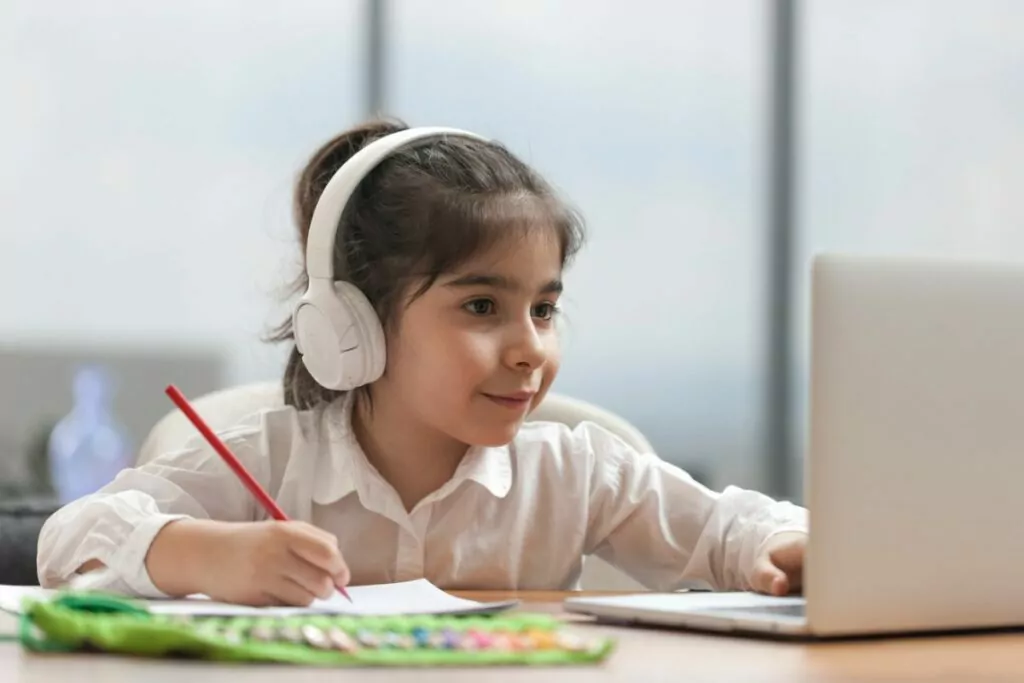
We’ll delve into the dissimilarities, advantages, and disadvantages of homeschooling vs. traditional schooling and hopefully provide some insight into the educational landscapes that parents have to explore.
The Educational Environment
One of the primary distinctions between homeschooling and traditional schooling is the learning environment, as traditional schools offer structured, classroom-based learning.
Homeschooling provides a flexibility that allows education to unfold within the comfort of a familiar environment. This flexibility can be particularly beneficial for children who thrive in a personalized setting and who function best in a place where they feel comfortable and safe.
Curriculum Customization
Homeschooling stands out for its flexibility in the curriculum as parents can tailor it to their child’s learning style and pace, which encourages a more profound understanding of subjects.
Traditional schools adhere to standardized curricula designed for large groups, which can potentially leave some students behind. The ability to customize a curriculum is a significant advantage for homeschooling, as it ensures that each child’s educational journey is uniquely tailored to their needs and can be delivered at a pace that suits the child instead of a standardized timetable.
Social Interaction
A critical consideration is social interaction, as traditional schooling provides consistent interaction with peers, which helps to develop essential social skills as students learn to navigate social dynamics, work in groups, and build relationships. In homeschooling, deliberate efforts are required to create social opportunities, ensuring children develop interpersonal skills beyond the family circle, and while homeschoolers can engage in community activities, join clubs, and participate in group events, it requires proactive planning on the part of parents.
Individualized Attention
An advantage of homeschooling is the ability to provide individualized attention, as in a school setting, teachers often face numerous challenges when attempting to cater to the diverse needs of a large classroom. Homeschooling allows parents to identify and address individual strengths and weaknesses, which makes sure that each child receives the attention they need to succeed academically.
Learning Pace
Flexibility in learning pace is another crucial factor, and homeschooling allows students to delve deeper into subjects of interest or spend additional time on challenging topics. This flexibility is invaluable in cultivating a genuine love for learning, but in traditional schools, the pace is generally standardized, which can potentially leave some students struggling to keep up while others may find the material unchallenging and, as a result, can, ultimately disengage from, and with, education.
Academic Performance
Numerous studies show that homeschoolers often outperform their traditionally schooled counterparts academically, and this success may be attributed to the personalized approach and the ability to focus on the aforementioned individual strengths and weaknesses. Homeschooling provides an environment where children can wholeheartedly grasp concepts, and parents can tailor teaching methods to suit their child’s learning style and strengths.
Time Flexibility
Homeschooling affords the luxury of time flexibility, which allows for unique learning opportunities, such as field trips, real-world experiences, and extended exploration of subjects.
Traditional schools operate on a fixed schedule, which may limit the time available for in-depth exploration or pursuing specific areas of interest.
Parental Involvement
Homeschooling necessitates significant parental involvement, and this increased engagement in a child’s education can strengthen the parent-child bond, but it does require dedication and time. Parents become not only educators but also learning facilitators and actively participate in their child’s academic journey. It isn’t for everyone, and we strongly advise that you think long and hard about whether or not it’s a journey that you want to embark on.
Extracurricular Activities
Traditional schools offer a range of extracurricular activities, from sports to clubs, fostering holistic development, and students have the opportunity to explore diverse interests and develop teamwork and leadership skills. While they can access similar opportunities through community programs, they may need to be more proactive in seeking them out, and this is one of the areas where parental involvement is crucial in ensuring a well-rounded educational experience.
Standardized Testing
One drawback of homeschooling is the potential lack of exposure to standardized testing, and even though some educators argue that this reduces stress, others believe it may hinder a child’s ability to perform well in future academic settings. Standardized testing is a prevalent feature of traditional schooling and provides a benchmark for academic performance, but homeschoolers can still prepare for standardized tests through specialized programs and resources.
Teacher Qualifications
In traditional schools, teachers are required to meet specific educational standards and undergo rigorous training and certification processes to ensure they are well-equipped to teach. Homeschooling, however, relies on the parents’ qualifications, raising questions about the consistency and quality of education.
Even though many homeschooling parents are highly capable educators, there is a potential variation in educational backgrounds and teaching styles.
Cost Of Homeschooling Vs. Traditional Schooling
Traditional schooling is often associated with costs such as tuition, uniforms, and extracurricular fees, and homeschooling while requiring an initial investment in supplies, can be more cost-effective in the long run. Homeschooling eliminates many of the traditional costs associated with schooling, and resources can often be reused for multiple children, but the financial impact is entirely dependent on the chosen curriculum and the availability of educational resources.
Diversity Of Perspectives
Traditional schools expose students to a diverse range of perspectives, which can potentially create a broader worldview as students interact with peers from different backgrounds, which helps to enhance cultural awareness. However, homeschooling, if not supplemented with diverse experiences, might inadvertently limit exposure to varying viewpoints, so families need to actively seek out opportunities for cultural enrichment to ensure a well-rounded education that includes diverse perspectives.
Transition To Higher Education
Concerns often arise regarding the transition from homeschooling to higher education, and while many homeschoolers successfully transition to college, some institutions may require additional documentation to assess their preparedness.
Parents and home-based educators need to carefully plan for the college application process to make sure their children meet admission requirements, and this may involve standardized testing, portfolios of work, and letters of recommendation.
Time Management Skills
Homeschooling cultivates strong time management skills as students learn to balance academic responsibilities with other daily activities, and they acquire the ability to set goals, prioritize tasks, and manage their time effectively. Traditional schools, with set schedules, may not provide the same level of autonomy, but the structured nature of traditional schooling can instill a sense of discipline and routine in students, which are valuable skills all children need for their academic and professional lives.
Parental Burnout
The responsibility of homeschooling can lead to parental burnout, especially for those juggling work and teaching, while traditional schooling, by distributing the teaching load among professionals, can alleviate this pressure. Parents who choose to homeschool need to be aware of the potential for burnout, and it’s essential to establish a support system, share responsibilities, and take breaks to prevent exhaustion.
Special Needs Education
Traditional schools often have specialized resources and trained professionals to support students with special needs, and homeschooling, while adaptable, may require additional resources and expertise. Families with children who have special needs face unique challenges in both homeschooling and traditional schooling, and the latter often have dedicated special education programs, while the former may need to seek out specialized resources and support groups. It’s a big decision and depends on the individual needs of the child and the available resources in the community.
Peer Pressure And Bullying
Traditional schools expose children to peer pressure and potential bullying, which can be absent or easier to manage in a homeschooling environment, and even though peer interactions in traditional schools can help to shape a child’s social development positively, they can also expose them to negative influences and the possibility of bullying. Homeschoolers, while avoiding traditional peer pressure, need to actively facilitate positive social interactions, and widespread concerns about bullying in traditional schools have led some parents to opt for homeschooling as a safer alternative.
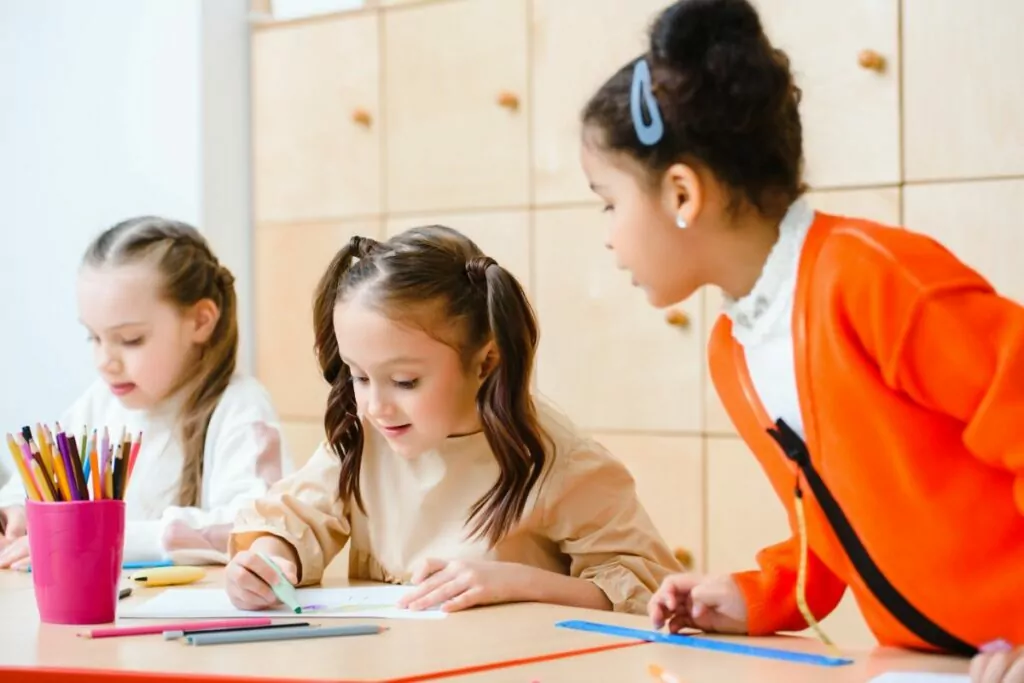
Homeschooling Vs. Traditional Schooling – The Pros And Cons
Pros of homeschooling.
- Customized Curriculum: Tailors the curriculum to the child’s learning style.
- Individualized Attention: Provides focused attention to address individual strengths and weaknesses.
- Flexible Learning Pace: Allows students to delve deeper into subjects of interest.
- Time Flexibility: Facilitates unique learning opportunities and field trips.
- Strong Parental Involvement: Strengthens the parent-child bond and active participation in the child’s academic journey.
- Cost-Effective: Eliminates many of the traditional costs associated with schooling.
Cons Of Homeschooling
- Limited Social Interaction: Requires proactive efforts to create social opportunities.
- Potential Lack of Standardized Testing Exposure: Raises concerns about future academic performance.
- Parental Qualifications: Relies on the parents’ qualifications, which can lead to potential variations in teaching styles.
- Parental Burnout: The responsibility of teaching can lead to burnout, especially for parents juggling work and teaching.
- Transition to Higher Education: Requires careful planning and additional documentation for college admission.
Pros Of Traditional Schooling
- Consistent Social Interaction: Provides opportunities for regular peer interaction.
- Diverse Extracurricular Activities: Offers a range of activities for holistic development.
- Exposure to Standardized Testing: Prepares students for standardized tests commonly used in higher education.
- Structured Learning Environment: Instills discipline and routine in students.
- Specialized Resources for Special Needs: Offers dedicated resources and support for students with special needs.
Cons Of Traditional Schooling
- Limited Curriculum Customization: Follows a standardized curriculum designed for large groups.
- Less Individualized Attention: Teachers face challenges in catering to diverse needs in a large classroom.
- Fixed Learning Pace: Potentially leaves some students struggling or unchallenged.
- Limited Time Flexibility: Operates on a fixed schedule, limiting time for in-depth exploration.
In weighing the pros and cons of homeschooling versus traditional schooling, it’s crucial to recognize that each approach has its merits and drawbacks, and the decision ultimately hinges on the unique needs and preferences of the family.
In Conclusion
As we explored the vast educational landscape, we found that while homeschooling demands dedication, it also offers unparalleled customization and flexibility, while traditional schooling, with its structured environment, provides a comprehensive social and educational experience. Regardless of the path that parents ultimately decide to pursue, the sole factor that should help them determine their course of action is the continued commitment to their child’s education and development.
Further reading: Homeschool or private school – which is best ?
- Recent Posts
- Homeschooling In High School: Pros And Cons - February 24, 2024
- How Do I Withdraw My Child From School To Homeschool? - February 23, 2024
- How To Not Go Crazy Homeschooling Kids: A Guide For Frazzled Parents - February 22, 2024
Related Posts:

Leave a comment Cancel reply
Your email address will not be published. Required fields are marked *
Save my name, email, and website in this browser for the next time I comment.
Home — Essay Samples — Education — Homeschooling — Public School vs. Homeschool
Public School Vs. Homeschool
- Categories: Homeschooling Public School
About this sample

Words: 687 |
Published: Jan 30, 2024
Words: 687 | Pages: 2 | 4 min read
Table of contents
Academic approach, socialization, flexibility and individualized learning, teacher-student ratio and attention.
- National Home Education Research Institute. (n.d.). Research Facts on Homeschooling. https://www.nheri.org/research-facts-on-homeschooling/
- Canadian Journal of Behavioural Science. (2004). Socialization of Homeschool Children: A Communication Approach. https://psycnet.apa.org/record/2004-20445-007
- Journal of Educational Psychology. (2009). Exploring Academic Outcomes of Homeschooled Students. https://psycnet.apa.org/record/2009-22973-002
- National Center for Education Statistics. (2021). Fast Facts: Teacher Trends. https://nces.ed.gov/fastfacts/display.asp?id=28

Cite this Essay
Let us write you an essay from scratch
- 450+ experts on 30 subjects ready to help
- Custom essay delivered in as few as 3 hours
Get high-quality help

Prof Ernest (PhD)
Verified writer
- Expert in: Education

+ 120 experts online
By clicking “Check Writers’ Offers”, you agree to our terms of service and privacy policy . We’ll occasionally send you promo and account related email
No need to pay just yet!
Related Essays
2 pages / 892 words
3 pages / 1318 words
2 pages / 966 words
2 pages / 1115 words
Remember! This is just a sample.
You can get your custom paper by one of our expert writers.
121 writers online
Still can’t find what you need?
Browse our vast selection of original essay samples, each expertly formatted and styled
Related Essays on Homeschooling
Educational choices are among the most significant decisions parents make for their children. One of the debates that has gained prominence in recent years is the choice between homeschooling and traditional public schooling. [...]
Homeschooling, an alternative to traditional classroom education, has gained popularity in recent years. While it offers certain advantages, it is essential to critically examine the potential drawbacks associated with [...]
Education is one of the essential aspects of a child's life, and as a parent, choosing the right method of education for your child can be a daunting task. Homeschooling and public schooling are two primary methods of education [...]
Homeschooling has become an increasingly popular alternative to traditional public and private education. With the rise of technology and the ability to access educational resources online, many parents are choosing to educate [...]
Homeschooling, also known as home education is the education of children at home or a variety of other places. Home education is usually conducted by a parent or tutor or online teacher. Many families use less formal ways of [...]
There are many advantages to homeschooling children. These benefits include the following:Excellent education. The overriding goal of homeschooling is to educate children. In this, homeschool excels. Because of the many [...]
Related Topics
By clicking “Send”, you agree to our Terms of service and Privacy statement . We will occasionally send you account related emails.
Where do you want us to send this sample?
By clicking “Continue”, you agree to our terms of service and privacy policy.
Be careful. This essay is not unique
This essay was donated by a student and is likely to have been used and submitted before
Download this Sample
Free samples may contain mistakes and not unique parts
Sorry, we could not paraphrase this essay. Our professional writers can rewrite it and get you a unique paper.
Please check your inbox.
We can write you a custom essay that will follow your exact instructions and meet the deadlines. Let's fix your grades together!
Get Your Personalized Essay in 3 Hours or Less!
We use cookies to personalyze your web-site experience. By continuing we’ll assume you board with our cookie policy .
- Instructions Followed To The Letter
- Deadlines Met At Every Stage
- Unique And Plagiarism Free
Homeschooling Vs Traditional Schooling
Homeschooling and traditional schooling are two educational approaches that parents can choose for their children. Each approach has its own unique advantages and disadvantages, and it is important for parents to consider these factors when making a decision.
Homeschooling offers several advantages, such as individualized education tailored to the child's specific needs, a flexible schedule that allows for personalized learning, and a stronger parent-child bond. However, there are also disadvantages to homeschooling, including limited social interaction, a lack of accreditation, and the time and financial commitment required from the parents.
On the other hand, traditional schooling has its own set of advantages. It provides opportunities for social development through interactions with peers, access to professional and qualified teachers, and a wide range of extracurricular activities. However, traditional schooling also has disadvantages, such as a lack of individual attention, a fixed curriculum, and limited flexibility.
When choosing between homeschooling and traditional schooling, parents should consider key factors such as the learning style and needs of the child, parental availability and commitment, socialization and peer interaction, and the availability of resources and support.
Table of Contents
Key takeaway:
- Homeschooling provides individualized education: Homeschooled students receive personalized attention and can progress at their own pace, allowing for a tailored learning experience.
- Homeschooling offers a flexible schedule: Homeschooling allows for the flexibility to adapt the schedule to the child's needs and interests, providing freedom and autonomy in planning educational activities.
- Homeschooling fosters a personalized learning environment: Homeschooled children can learn in a comfortable and familiar space, customized to their learning style and preferences.
- Traditional schooling promotes social development: Regular interactions with peers in a school setting allow children to develop social skills, make friends, and learn how to navigate different social situations.
- Traditional schooling provides access to professional and qualified teachers: Students in traditional schools can benefit from the expertise and experience of teachers who are trained in specific subjects.
- Traditional schooling offers access to extracurricular activities: Students have the opportunity to participate in a wide range of extracurricular activities such as sports, clubs, and arts programs, enhancing their overall development.
- Homeschooling may have limited social interaction: One potential drawback is the reduced opportunity for socializing with peers, which may require additional effort to provide socialization opportunities.
- Homeschooling may lack accreditation: Homeschooling programs may not be accredited, which can impact college admissions or future educational opportunities.
- Homeschooling requires time and financial commitment: Parents who choose homeschooling must dedicate significant time and resources to ensure a well-rounded education.
- Traditional schooling may lack individual attention: With a large number of students in a classroom, individualized attention may be limited, potentially affecting learning outcomes for some students.
- Traditional schooling follows a fixed curriculum: Students typically follow a pre-determined curriculum, offering less flexibility to explore personal interests or focus on specific areas of study.
- Traditional schooling has limited flexibility: Students have less control over their daily schedules and may have less flexibility to pursue outside interests or engage in other learning opportunities.
- When choosing between homeschooling and traditional schooling, consider the child's learning style and needs: Different educational approaches may be better suited to different learning styles, so it is important to consider how the child learns best.
- Parental availability and commitment are crucial factors in choosing homeschooling: Homeschooling requires a significant commitment from parents, both in terms of time and effort.
- Socialization and peer interaction should be considered: The social aspect of education is important for a child's development, so parents should ensure that homeschooling provides opportunities for socialization.
- Resources and support are essential in homeschooling: Access to educational resources, materials, and a strong support system can enhance the effectiveness of homeschooling.
Conclusion: The choice between homeschooling and traditional schooling depends on various factors and the specific needs of the child. Parents should carefully consider the advantages and disadvantages of each option before making a decision.
Advantages of Homeschooling
Discover the incredible advantages of homeschooling that set it apart from traditional schooling. From individualized education to a flexible schedule, a personalized learning environment, and a stronger parent-child bond, homeschooling offers a wealth of benefits. Experience the power of tailoring education to your child's unique needs, enjoying the freedom to set your own schedule, creating a nurturing learning environment, and fostering a deep connection with your child. Explore the endless possibilities that homeschooling brings to the table and embark on an educational journey like no other.
Individualized Education
Individualized education is a fundamental advantage of homeschooling. In this approach, parents have the freedom to customize their child's education to their specific needs and learning style. They can tailor the curriculum, pace, and teaching methods to ensure optimal learning. This individualization enables children to grasp concepts more effectively and progress at their own pace.
Through individualized education, children receive personalized attention and support. Parents can focus on areas where their child may require additional assistance, offering targeted instruction and supplementary resources. This approach fosters a deeper understanding of subjects and helps children develop confidence in their abilities.
Furthermore, individualized education promotes a sense of autonomy and responsibility in children. They learn to take ownership of their learning, making choices and setting goals that align with their interests and aspirations. This autonomy nurtures a love for learning and enhances their overall educational experience.
To ensure successful individualized education, parents should stay updated on educational resources and teaching techniques. They should seek support from homeschooling communities and make use of online platforms and educational materials to enhance their child's learning. By combining these resources with a tailored approach, they effectively nurture each child's unique potential.
Consider incorporating diverse teaching methods, providing hands-on activities, exploring educational field trips, and conducting regular assessments to track progress. By embracing individualized education, parents can provide a stimulating and enriching learning journey for their child.
Flexible Schedule
A flexible schedule is one of the advantages of homeschooling. This allows for personalized and individualized learning, accommodating the needs and preferences of both the student and parent.
- 1. Customizable Daily Routine: Homeschooling offers the advantage of a flexible schedule, allowing for personalized learning at optimal times for the student. Whether they are early risers or night owls, students can tailor their schedule to their learning style and preferences.
- 2. Personalized Pace: Each child learns at their own pace, and homeschooling provides the flexibility to accommodate this. With a flexible schedule, students can spend more time on challenging topics or move quickly through subjects they excel in, ensuring individualized instruction.
- 3. Accommodating Interests and Activities: Homeschooling allows students to pursue their passions and interests. The flexibility of a homeschooling schedule enables them to allocate time for extracurricular activities, hobbies, and exploration of subjects beyond the traditional curriculum.
- 4. Family and Travel: Homeschooling offers the freedom to incorporate family vacations and travel into the educational experience. With a flexible schedule, students can learn from different environments, cultures, and experiences while maintaining continuity in their education.
- 5. Personal and Family Commitments: A homeschooling schedule can easily accommodate personal and family commitments. Whether it's medical appointments, religious observances, or family events, a flexible schedule ensures a seamless integration of education into daily life.
The flexibility of homeschooling ensures that learning can be tailored to the individual needs of the child, promoting a more personalized and engaging educational experience.
Personalized Learning Environment
The personalized learning environment is a key advantage of homeschooling. It allows for tailored educational experiences that cater to the individual needs and strengths of the child.
- Individualized instruction: In a personalized learning environment, parents can customize the curriculum and teaching methods to suit their child's learning style and pace.
- Flexible scheduling: Homeschooling provides the flexibility to adapt the daily routines and schedules to accommodate the child's interests, strengths, and individual learning pace.
- Focused attention: With one-on-one instruction, homeschooling offers the opportunity for undivided attention and personalized support, ensuring that the child's specific educational needs are met.
- Cultivating interests and passions: Homeschooling allows for the exploration and deep dive into subjects that spark the child's curiosity, fostering a love for learning and the chance to pursue their passions.
- Creating a safe and supportive environment: In a personalized learning environment at home, children can feel comfortable expressing themselves, taking intellectual risks, and building confidence in their abilities.
In order to create an effective personalized learning environment, it is important for parents to actively engage with their child's education, adapt teaching strategies as needed, and provide a variety of resources and materials to support learning. Regular communication and collaboration with other homeschooling families or educational communities can also enhance the personalized learning experience. Ultimately, the personalized learning environment of homeschooling provides a unique opportunity for children to thrive academically and develop lifelong skills and interests.
Stronger Parent-Child Bond
The stronger parent-child bond is an important aspect to consider when choosing between homeschooling and traditional schooling. Here is a list of reasons why homeschooling can foster a stronger parent-child bond:
- Increased quality time: Homeschooling allows for more one-on-one time and interaction between parents and children, resulting in a stronger parent-child bond. This quality time spent together deepens the bond and strengthens the relationship.
- Personalized attention: Parents who homeschool have the opportunity to understand their child's strengths, weaknesses, and learning styles on a deeper level, leading to a stronger parent-child bond. This personalized attention creates a stronger connection and helps parents better support their child's educational journey.
- Shared values and beliefs: Homeschooling gives parents the ability to incorporate their values, beliefs, and worldview into their child's education, fostering a stronger parent-child bond. This shared experience allows parents and children to align their perspectives and reinforce important values.
- Emotional support: Homeschooling allows parents to be more involved in their child's emotional well-being, which contributes to a stronger parent-child bond. They have the opportunity to provide guidance, nurture their child's emotional development, and address any challenges or concerns more directly, building a stronger bond of trust and support.
- Collaborative learning: Homeschooling often involves parents and children working together as a team, resulting in a deeper parent-child bond. This collaborative approach to learning promotes a sense of unity and shared accomplishment while strengthening the parent-child relationship.
The stronger parent-child bond that homeschooling cultivates can have a profound impact on a child's overall well-being and development.
Disadvantages of Homeschooling
Homeschooling may have its advantages, but in this section, let's explore the potential drawbacks that come with this alternative form of education.
From limited social interaction to concerns about accreditation and the time and financial commitments involved, we'll delve into these aspects that parents should consider when opting for homeschooling.
So, before you make a decision, it's essential to be fully aware of the potential disadvantages that homeschooling might bring.
Limited Social Interaction
Dealing with Limited Social Interaction in Homeschooling
- Homeschooling can lead to limited social interaction for children, a potential drawback of this educational choice. Without the daily interaction with peers in a traditional school setting, homeschooled children may have fewer chances to develop social skills and form friendships.
- Interacting primarily with a small group of siblings or parents as the main source of socialization may not offer the same diverse experiences and perspectives that come from interacting with a larger group of peers.
- Homeschooled children might miss out on important social experiences such as group projects, teamwork, and learning to navigate social dynamics in a larger social setting.
- To address this issue, homeschooling parents can actively seek out opportunities for their children to connect with peers and engage in social activities. Joining homeschooling co-ops, participating in community organizations, and extracurricular activities can help foster social interaction.
- Additionally, homeschooled children can broaden their social circle and interact with peers who share similar interests by participating in sports teams, clubs, and community organizations.
- Parents should prioritize creating occasions for social interaction and take initiative in finding social outlets for their homeschooling children.
- Arranging regular playdates, joining local homeschooling groups, and participating in community events can provide opportunities for homeschooled children to interact with others outside of their immediate family.
- While limited social interaction may be a drawback of homeschooling, it is important to acknowledge that it still allows for high-quality social interaction, with more opportunities for one-on-one interactions and the ability to focus on building deep and meaningful relationships.
Lack of Accreditation
The lack of accreditation in homeschooling can have significant implications for students and their educational journey. Here are some important points to consider regarding the lack of accreditation:
1. Evaluation process: Homeschooled students may not have access to the same standardized assessments and evaluations as their peers in traditional schools. As a result, it becomes challenging to provide external validation of their academic progress.
2. College admission: Certain colleges and universities may require accreditation or transcripts from accredited institutions. Without accreditation, homeschooled students may encounter additional scrutiny during the college application process.
3. Recognition of qualifications: Accreditation may be necessary in certain professions or industries to obtain licenses or certifications. Without accreditation, homeschooled students may face difficulties when pursuing specific career paths.
4. Transferability of credits: If a homeschooled student decides to transition to a traditional school setting, the lack of accreditation can pose challenges in transferring credits. Each school has its own policies regarding the acceptance of homeschooled credits.
5. Parental responsibility: As homeschooling lacks accreditation, the responsibility for ensuring a high-quality education solely falls on the parents or guardians. They must demonstrate their ability to provide comprehensive and rigorous instruction to meet educational standards.
It is important to note that not all states or countries require homeschooling programs to be accredited. However, recognizing the potential limitations and considering alternative methods of assessing progress can help homeschooling families mitigate the impact of the lack of accreditation.
Time and Financial Commitment
When considering the time and financial commitment of homeschooling, it is essential to take into account the following factors:
- Education materials and resources: Homeschooling necessitates the purchase of curriculum materials, textbooks, and other educational resources. The cost of these materials can vary depending on the grade level and subjects being taught.
- Tutoring or co-op fees: Some homeschooling families opt to join tutoring programs or cooperative learning groups, which may require additional fees for participation. These programs can provide specialized instruction or opportunities for socialization.
- Supplemental activities: Homeschooling can involve additional expenses for extracurricular activities, such as sports, music lessons, art classes, or field trips. These activities are often chosen to enhance the child's education and provide opportunities for social interaction.
- Parental commitment: Homeschooling demands a significant time commitment from parents or guardians who take on the role of primary educators. This commitment includes planning lessons, teaching, and providing individualized attention to each child's learning needs.
- Lost income: If a parent chooses to homeschool, they may need to reduce or forgo their employment to fully dedicate their time and attention to their child's education. This decision can impact family finances and should be considered when assessing the financial commitment of homeschooling.
Advantages of Traditional Schooling
Photo Credits: Ultimatehomeschooling.Org by Roy Jackson
In the realm of education, traditional schooling holds a multitude of advantages that cannot be overlooked. From fostering social development to benefiting from professional and qualified teachers, and the invaluable access to extracurricular activities, this section explores the many ways in which traditional schooling offers a comprehensive educational experience. Step into the world of brick-and-mortar classrooms where students flourish socially, academically, and beyond!
Social Development
Social development is a crucial aspect to take into account when deciding between homeschooling and traditional schooling.
In traditional schools, students have regular opportunities for social interaction with their peers. They can establish friendships, participate in group activities, and cultivate social skills that are vital for their future interactions in the wider society. The classroom environment provides a structured setting where students learn to work collaboratively, resolve conflicts, and navigate social dynamics.
Conversely, homeschooling may provide fewer chances for social development. Without the daily interactions with classmates, homeschoolers may lack opportunities to practice their social skills in a school environment. Consequently, homeschooling parents must offer alternative avenues for socialization, such as extracurricular activities, sports teams, or co-op classes, where their child can engage with peers.
It is important to emphasize that social development is not solely reliant on school environments. Homeschooled children can still partake in social activities outside of school and build meaningful relationships. Additionally, homeschooling provides occasions for children to interact with individuals of different ages and backgrounds, fostering a broader understanding of society.
In the end, the decision between homeschooling and traditional schooling should take into consideration the social development needs of the child, weighing the benefits of structured social interactions in traditional schools against the potential for socialization in alternative settings in homeschooling.
Professional and Qualified Teachers
When it comes to traditional schooling, one of the key advantages is the presence of professional and qualified teachers. These teachers possess the necessary education , experience , and skills to effectively teach students in a classroom setting.
- Expertise : Professional and qualified teachers have undergone extensive training and education in their respective subjects. They have a deep understanding of the curriculum and are equipped with the knowledge and resources to deliver quality education.
- Teaching methods : These teachers are well-versed in various teaching strategies and techniques. They know how to engage and motivate students, adapt their lessons to different learning styles, and provide individualized instruction when needed.
- Subject matter knowledge : Besides having general teaching skills, professional and qualified teachers have in-depth knowledge of the subjects they teach. They can explain complex concepts, answer questions, and guide students in their learning journey.
- Assessment and feedback : Effective teachers know how to assess students' learning progress and provide constructive feedback. They use various assessment methods to evaluate understanding and identify areas that need improvement. This helps students track their growth and development.
- Professional support : Professional and qualified teachers often have access to professional development opportunities, allowing them to stay updated with the latest teaching practices and educational trends. This ongoing growth and improvement benefit both teachers and their students.
When choosing between homeschooling and traditional schooling, the presence of professional and qualified teachers in traditional schools can provide students with a structured and well-rounded education. It ensures that students have access to knowledgeable individuals who are dedicated to their academic success.
Access to Extracurricular Activities
When deciding between homeschooling and traditional schooling, access to extracurricular activities is an important consideration. Here are some factors to think about:
- Range of activities: Traditional schools offer a diverse range of extracurricular activities, including sports teams, clubs, and arts programs. These activities allow students to explore their interests, acquire new skills, and socialize with classmates.
- Dedicated resources: Traditional schools typically have dedicated facilities, equipment, and qualified instructors for various extracurricular activities. This ensures that students have access to specialized resources that can enhance their learning and personal development.
- Social interaction: Extracurricular activities in traditional schools provide students with opportunities to interact and collaborate with a diverse group of peers. This fosters teamwork, facilitates the building of friendships, and promotes the development of essential social skills.
- Community engagement: Traditional schools often organize events and community outreach programs as part of their extracurricular activities. This allows students to engage with their local community, contribute to meaningful causes, and cultivate a sense of civic responsibility.
- Networking opportunities: Participating in extracurricular activities at traditional schools can also provide students with valuable networking opportunities. They can connect with teachers, coaches, and professionals in their areas of interest, which can be advantageous for their future career prospects.
While homeschooling may offer flexibility and the chance to explore extracurricular activities outside of the traditional school setting, parents may need to exert additional effort to find and organize such activities. When deciding on access to extracurricular activities, it is important to consider your child's interests and goals.
Disadvantages of Traditional Schooling
Traditional schooling may not always be the ideal choice for everyone. Let's dive into the disadvantages of this educational system. In this section, we'll explore the lack of individual attention, fixed curriculum, and limited flexibility that can hinder a student's learning experience. Buckle up and get ready to uncover some eye-opening drawbacks of traditional schooling!
Lack of Individual Attention
In the realm of traditional schooling, one of the primary drawbacks is the absence of individual attention. In a typical classroom setup, teachers often have to handle a significant number of students, thereby facing challenges in delivering personalized attention to each student. This situation can lead to students feeling neglected or encountering difficulties in obtaining the necessary assistance.
The absence of individual attention may impede students' complete understanding of certain concepts or hinder their ability to seek clarification when faced with confusion. Consequently, their overall comprehension and academic progress can suffer. Moreover, students with specific learning requirements or a slower pace of learning may require supplementary support, which may not be readily accessible within a traditional school environment.
To tackle this issue, parents who choose traditional schooling should consider supplementing their child's education with additional tutoring or exploring opportunities for one-on-one instruction. By doing so, they can ensure that their child receives the personalized attention and support essential for academic success.
Pro-tip: If you observe a lack of individual attention while your child attends a traditional school, don't hesitate to communicate with the teacher and school administration. They may be able to provide extra resources or strategies to support your child's individual learning needs.
Fixed Curriculum
Traditional schooling follows a fixed curriculum that is standardized across schools and districts.
This means that all students in a particular grade level are expected to learn the same subjects and content at the same pace.
There is little room for flexibility or individualization in terms of curriculum.
While this can ensure that all students receive a similar education, it may not cater to the unique needs and learning styles of every child.
For example, a student who excels in a particular subject may not be able to advance at a faster pace, while a student who struggles in a subject may not receive the additional support they need.
Furthermore, a fixed curriculum may not allow students to explore their own interests and passions, as they have limited control over the subjects they study.
It is important for parents to consider whether a fixed curriculum aligns with their child's learning needs and goals.
Some students thrive in a structured and predictable learning environment, while others may require more flexibility and individualized instruction.
By understanding the implications of a fixed curriculum, parents can make an informed decision about the best educational option for their child.
Limited Flexibility
Limited flexibility is a potential disadvantage of traditional schooling. In a traditional school setting, students face restricted control over their daily schedules and curriculum. The inflexible daily schedule and fixed curriculum can hinder a student's ability to pursue other activities or interests outside of school. For instance, if a student wishes to explore a specific hobby or take additional classes in a particular subject, the rigid structure of traditional schooling may not permit such flexibility.
Moreover, traditional schools commonly have predetermined start and end times, which restrict the students' capacity to work at their own pace or accommodate personal commitments. This lack of flexibility can pose challenges for students who require a more personalized approach to their education.
Nevertheless, it is important to note that the degree of flexibility can vary among different traditional schools. Certain schools may provide more flexibility in terms of electives, extracurricular activities, or alternative schedules. It is crucial for parents and students to consider their specific needs and priorities when deciding between homeschooling and traditional schooling to determine the level of flexibility that aligns with their goals.
Fact: Research has indicated that students who attend schools with greater flexibility in scheduling and curriculum exhibit higher levels of motivation and engagement in their education.
Key Considerations When Choosing Between Homeschooling and Traditional Schooling
When deciding between homeschooling and traditional schooling, there are several key considerations to keep in mind. Understanding the learning style and needs of your child, the level of parental availability and commitment required, the importance of socialization and peer interaction, and the availability of resources and support are all crucial factors that can guide your decision-making process. Join me as we explore these aspects and unravel the essential elements in choosing the right educational path for your child.
Learning Style and Needs of the Child
When considering the best schooling option for your child, it is crucial to take into account their learning style and needs. Each child has a unique way of absorbing and processing information.
- Learning style: Different children have different learning styles, such as visual, auditory, or kinesthetic. It is important to choose a schooling method that aligns with your child's preferred Learning Style and Needs of the Child . For example, if your child is a visual learner, homeschooling may provide the flexibility to incorporate visual aids and hands-on activities into their education.
- Individualized attention: Some children thrive with one-on-one attention, while others may benefit from peer interactions in a traditional school setting. Consider whether your child requires personalized attention or flourishes in a collaborative environment.
- Special needs: If your child has specific learning needs or disabilities, you must consider whether homeschooling or traditional schooling can provide the necessary support and accommodations.
- Curriculum and pace: Evaluate whether your child needs a curriculum tailored to their interests and strengths or benefits from a structured curriculum with set milestones and goals.
- Flexibility: Take into account your child's extracurricular activities, hobbies, and interests. Consider how well each schooling option can accommodate and support their outside commitments.
By considering your child's learning style and needs, you can make an informed decision that ensures they receive the best education suited to their unique Learning Style and Needs of the Child .
Parental Availability and Commitment
When considering the option of homeschooling or traditional schooling, parental availability and commitment play a crucial role in determining the right choice for your child's education.
- Time commitment: Homeschooling requires a significant time investment from parents. They must be willing to dedicate a substantial amount of time to planning lessons, teaching, and assessing their child's progress. This dedication ensures that the child's education receives the necessary attention.
- Flexibility: Homeschooling allows for flexibility in terms of scheduling. Parents with parental availability and commitment have the freedom to create a learning routine that accommodates the child's individual needs and interests. This flexibility allows for personalized instruction and enhances the learning experience.
- Active involvement: Homeschooling relies heavily on parental involvement. Parents with parental availability and commitment act as the primary educators and, therefore, must be actively engaged in their child's learning journey. This involvement fosters a close parent-child bond and provides opportunities for tailored instruction.
Fact: Research has shown that parental involvement in a child's education positively affects their academic achievement and overall well-being.
Socialization and Peer Interaction
Socialization and peer interaction are vital components in a child's development and overall well-being. When deciding between homeschooling and traditional schooling, it is crucial to take these factors into consideration.
1. Homeschooling may offer limited opportunities for social interaction, potentially hindering a child's social skills and ability to form meaningful relationships with peers. However, parents can address this by actively seeking out socialization opportunities, such as joining homeschooling co-ops or community groups.
2. Traditional schooling provides regular chances for socialization and peer interaction. Children can interact with classmates, participate in group activities, and build friendships, ultimately enhancing their social skills, teamwork abilities, and emotional intelligence.
3. Parents should evaluate their child's individual needs and preferences when considering the importance of socialization and peer interaction. Some children thrive in structured social environments, while others may prefer the personalized interactions offered by homeschooling.
4. To ensure that the chosen educational approach aligns with the child's socialization needs, it is essential for parents to consider how socialization and peer interaction will be addressed in homeschooling. This can be done through extracurricular activities, sports teams, or community programs.
By carefully considering the impact of socialization and peer interaction, parents can make an informed decision that best supports their child's overall development and growth.
Resources and Support
When considering whether to homeschool or choose traditional schooling for your child, having access to resources and support is crucial. Here are some key aspects to consider:
- Curriculum materials: Look for homeschool curricula that provide comprehensive resources and support , including textbooks, workbooks, and online resources. Traditional schools often have a designated curriculum chosen by the district or state.
- Cooperative groups and organizations: Joining homeschooling cooperatives or organizations can provide resources and support . These groups often organize field trips, social activities, and share teaching materials.
- Tutoring and classes: Homeschoolers may benefit from enrolling their child in supplemental classes or hiring tutors for specific subjects, like math or science. Traditional schools usually offer a wide range of classes taught by qualified teachers.
- Online communities and forums: Connect with other homeschooling families through online platforms where you can seek advice, share resources and support , and find support from experienced homeschoolers.
- Special needs support: If your child has special needs, research the availability of special education services in your area. Traditional schools often have dedicated professionals and resources and support to support students with diverse needs.
- Library resources: Utilize your local library for access to books, educational materials, and research resources. Libraries often organize educational programs for children, such as storytime or STEM activities.
In terms of resources and support , let me share a true story. Sarah, a homeschooling mom, struggled to find resources and support to teach her visually impaired daughter. She joined an online community for parents of visually impaired children and discovered a wealth of accessible educational materials and support. With the help of these resources and support , she was able to create a tailored curriculum and provide her daughter with an enriching homeschooling experience.
Some Facts About Homeschooling Vs Traditional Schooling:
- ✅ Homeschooling has become more popular in recent years, with around 48,000 children in the UK being homeschooled. (Source: gethomeschooled.com)
- ✅ Homeschooling allows parents to have more control over the curriculum and subjects studied, and they can tailor the program to their child's needs and interests. (Source: gethomeschooled.com)
- ✅ Homeschooling offers a customizable curriculum that can be tailored to a child's pace of learning and individual interests. (Source: masterygenius.com)
- ✅ Traditional schooling provides the advantage of highly trained teachers who have subject knowledge and effective teaching methods. (Source: gethomeschooled.com)
- ✅ Homeschooled children often achieve higher academic performance and have a stronger bond with their teachers and families. (Source: masterygenius.com)
Frequently Asked Questions
1. what are the factors to consider when deciding between homeschooling and traditional schooling.
When deciding between homeschooling and traditional schooling, it is important to consider factors such as your child's age, academic ability, social needs, and your family's schedule. You should also think about the level of involvement required from parents, the resources and support available for homeschooling, and the educational quality of both options.
2. How does homeschooling benefit a child's academic achievement?
Homeschooling can benefit a child's academic achievement in several ways. It allows for a customizable curriculum tailored to a child's pace of learning, individual interests, and learning style. Homeschooled children often receive more attention from teachers and can learn at their own pace without feeling embarrassed or left behind. Higher academic performance and improved test scores, including on standardized tests, have been observed among homeschooled children.
3. What are the advantages of traditional schooling?
Traditional schooling offers several advantages, including access to highly trained teachers with subject knowledge and effective teaching methods. The presence of other students in a school environment can teach valuable social skills and provide opportunities for collaboration and learning from peers. Traditional schooling also allows parents to pursue other commitments, such as work, while their child is in school.
4. How does homeschooling promote parent-child bonding?
Homeschooling provides a unique opportunity for parent-child bonding, as it allows for more time spent together. Parents can actively participate in their child's education, creating a strong bond and shared learning experiences. The flexibility of homeschooling also enables parents to engage in family activities and outings, strengthening family relationships.
5. Are there any physical benefits to homeschooling?
Homeschooling can offer physical benefits to children as well. With a flexible schedule, homeschoolers have the opportunity for outdoor learning and physical activities. They can engage in sports and exercise during the day, promoting physical fitness and overall health.
6. How does homeschooling address socialization concerns?
Contrary to popular belief, homeschooling provides ample opportunities for socialization. Homeschooled children can participate in community activities, clubs, sports, and other extracurricular activities. They can interact with a diverse range of individuals and develop social skills in various settings. Additionally, homeschooling offers a safer environment with smaller class sizes, allowing for more personalized attention and reducing social pressures often found in traditional schooling.
Related Posts
Homeschool history curriculum, homeschool assessment, homeschool education, leave a reply cancel reply.
Save my name, email, and website in this browser for the next time I comment.
Terms and Conditions - Privacy Policy
- Trying to Conceive
- Signs & Symptoms
- Pregnancy Tests
- Fertility Testing
- Fertility Treatment
- Weeks & Trimesters
- Staying Healthy
- Preparing for Baby
- Complications & Concerns
- Pregnancy Loss
- Breastfeeding
- School-Aged Kids
- Raising Kids
- Personal Stories
- Everyday Wellness
- Safety & First Aid
- Immunizations
- Food & Nutrition
- Active Play
- Pregnancy Products
- Nursery & Sleep Products
- Nursing & Feeding Products
- Clothing & Accessories
- Toys & Gifts
- Ovulation Calculator
- Pregnancy Due Date Calculator
- How to Talk About Postpartum Depression
- Editorial Process
- Meet Our Review Board
The Pros and Cons of Homeschooling
Fabio Principe / iStock / Getty Images Plus
Choosing to homeschool your kids is not a new concept. But during the COVID-19 pandemic, the phrase “school choice” took on a whole new meaning as more and more parents considered homeschooling a solution for their families.
To curb the spread of the virus, school districts around the country offered a variety of educational possibilities , from in-person school with masks to full online school to a delayed start to the academic year to a hybrid model that offered some days in a physical classroom and other days virtually.
Even as things opened back up and returned to normal, some schools continued to offer a virtual option. And since some younger kids are still unable to get the vaccine, some families feel uncertain about sending their kids back to brick-and-mortar schools.
UPDATE: November 2022
On October 20, 2022, the Center for Disease Control's Advisory Committee on Immunization Practices voted to add COVID-19 vaccination to the childhood immunization schedule. While the CDC makes vaccine recommendations, each state will determine which ones are required for school entry. The updated schedule is set to be released in early 2023.
If you’re thinking of teaching your child at home for the first time, or you've always considered this option for your family, you likely know there are many pros and cons.
We’ve rounded up a list of common advantages and pitfalls you may encounter—with input from real-world homeschooling parents. As you weigh your decision, give some thought to how each of these might impact your own circumstance and trust that whatever decision you make will be the right one for your family.
Flexibility
Individualized education
Strong relationships
A lot of work
Less time for yourself
Inability to work
Too much togetherness
Missing out on certain opportunities
Facing judgment and bias
Whether you call it self-determination, freedom, or control, one clear advantage of homeschooling is the ability to make your own choices. As a homeschooler, you’ll be able to freely travel or move, include religious teaching in day-to-day learning, and not worry about social pressures or bullying your child may encounter at school.
Plus, in home-based education, all subjects are fair game, from sailing to sewing to science. Practical skills, volunteering , artistic pursuits, and traditional trades can all fall under the broad umbrella of homeschooling. According to some homeschoolers, teachable moments are always happening, and "school" isn't limited to school hours.
Who doesn’t like to set their own schedule? By educating at home, you determine the structure of your day. If your child struggles to wake up by 7:00 a.m., for example, you can start school later. And, since homeschool timing is fluid, you can go ahead and make your child's dentist appointment on a Tuesday at noon.
You even have room to push back a lesson when you (or your kids) just aren’t feeling it. There are many ways to make it up later.
Individualized Education
Every child is different. Unfortunately, in the larger group setting of regular school, teachers can’t always tailor lessons to your child’s unique needs. At home, on the other hand, you can meet your child right where they are, customizing lessons to their particular interests.
Does your younger child need a little extra help with math ? Take an extra 15 minutes to help them understand fractions. Is your older kid into outer space? Start an astronomy unit!
Homeschooling also lets you vary your approach from child to child if you have more than one—in terms of learning styles and grade levels. Plus, you get to celebrate any success or achievement together in real time.
Strong Relationships
The more time you spend with your kids, the more opportunities arise for bonding. If you’ve always wished for more hours in the day as a family, perhaps homeschooling is the boon you’ve been craving.
Positive experiences like fun field trips , a-ha moments in learning, and “recess” at the park can all build closer parent-child and sibling-to-sibling relationships .
In some cases, homeschooling’s flexible schedule can even allow for more time with both parents—if work schedules usually limit time together on weekends or holidays.
A Lot of Work
In addition to the domestic responsibilities of your role as a parent, you’re now a teacher, tutor, curriculum researcher, and principal.
It’s quite possibly the humdinger of all reasons not to homeschool: Teaching your kids at home is simply a lot of work.
Creating, teaching, and grading a day’s or week’s worth of learning on multiple subjects takes serious time and effort. (However, many prepared curriculum packages do exist.) Plus, as delightful as it can be to tailor education to each child’s learning style, this can add to your workload, too.
And if you have younger children at home who aren’t school age, you may also struggle to keep them occupied while you sit down to teach older kids.
Less Time for Yourself
Not surprisingly, the workload of homeschooling—and kids home all day—is likely to leave you with less time for yourself. Some homeschooling parents say they don’t have time to shower, let alone exercise or take care of their own needs.
For parents who are used to a quiet, kid-free environment during the day, this aspect of homeschooling can be a major adjustment.
Inability to Work
All the work of homeschooling is guaranteed to take up hours of your day. Therefore, as a homeschooling parent, you may not be able to work outside the home, or you may have to cut your hours significantly. For some households, this may be a financial deal-breaker.
Too Much Togetherness
While many families find that homeschooling boosts good vibes between siblings and parents, there is such a thing as too much togetherness.
You may find that spending all day, every day, with your kiddos (and they with each other) leads to feelings of frustration or confinement . You may also go through an adjustment period as your kids learn how to view (and respect) you as their teacher.
It’s important to work in breaks, both for yourself and your kids. Or, depending on the resources in your area, you might try a homeschooling co-op or enrichment program one day a week to provide your kids socialization with others outside the family.
Missing Out on Certain Opportunities
Despite the enormous flexibility of homeschooling, in some ways, it can limit opportunities for your child. For high schoolers, for example, a homeschool curriculum may not be able to provide the same variety of electives as a large public school. (After all, most of us don’t have a metal shop in the backyard.)
If your child wants to pursue subjects you can’t easily teach at home, you’ll have to be diligent about seeking alternatives.
The same holds for social opportunities. As a homeschooler, it’s up to you to provide social interaction your child won’t get from school dances, assemblies, and everyday classroom partner work.
Facing Judgments and Biases
Let's be honest: Homeschooling doesn’t necessarily have a reputation for being cool and modern. Unfortunately, plenty of biases and stereotypes exist around homeschooling and the folks who choose it.
If you decide to educate at home, you might get some flak from family members (or even strangers) who think you’re going full Little House on the Prairie mode or that your kids won’t actually learn anything. You may need to develop a thick skin toward other people’s judgments of your decision to educate at home.
A Word From Verywell
When more and more parents are exploring the wide world of homeschooling, it’s wise to look at the many advantages and disadvantages of this type of education.
Do some soul searching and have a serious discussion with your partner about whether this could be the right choice for your child's and family's needs. And don’t forget to find out how your kids feel about the subject! With everyone’s thoughts and feelings on the table, you can determine if homeschooling is best for you and your family.
The Centers for Disease Control and Prevention. ACIP Immunization Schedule Vote .
By Sarah Garone Sarah Garone, NDTR, is a freelance health and wellness writer who runs a food blog.
- Join Your Trial Class
- Book FREE Trial Now

Homeschooling vs. Traditional Schooling: Exploring the Differences and Considerations
In the realm of education, the debate between homeschooling and traditional schooling has gained prominence in recent years. Each approach offers unique advantages and challenges, making it crucial for parents to make informed decisions that align with their children’s needs and family dynamics.
In this blog, we delve into the intricacies of these two educational paths, exploring their respective pros and cons. By the end, you’ll be better equipped to determine which avenue best suits your child’s educational journey.
Table of contents
Defining homeschooling and traditional schooling, the rise of homeschooling and reasons for its popularity, advantages of homeschooling, challenges of homeschooling, benefits of traditional schooling, challenges of traditional schooling, social interaction in homeschooling, socialization in traditional schooling, homeschooling curriculum options, curriculum in traditional schools, faq’s (frequently asked questions).
Before we delve into the details, let’s establish a clear understanding of homeschooling and traditional schooling. Homeschooling refers to the practice of parents or guardians taking on the role of educators for their children, providing education within the confines of their home environment.
When considering homeschooling vs. traditional schooling, it’s important to recognize that your chosen parenting style can significantly influence the educational approach that aligns best with your family’s values and goals.
On the other hand, traditional schooling involves sending children to a structured educational institution where they are taught by qualified educators and engage with peers in a classroom setting.
Homeschooling has been on the rise in recent times, with families opting for this alternative educational approach.
This surge can be attributed to several factors, including dissatisfaction with the traditional schooling system, concerns about safety and bullying, and the desire for a more personalized learning experience tailored to individual needs and interests.
In the debate between homeschooling and traditional schooling, the choice often hinges on how parents’ diverse parenting skills can impact the quality of education their children receive.
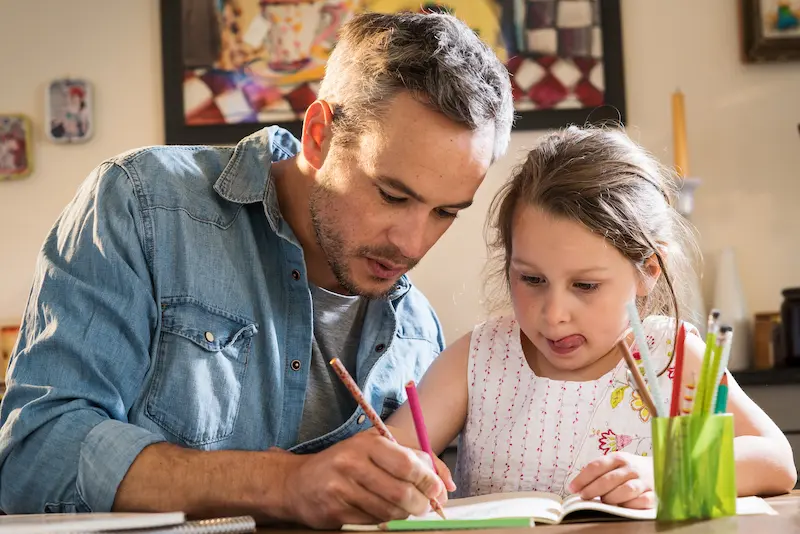
Homeschooling: Pros and Cons
Homeschooling offers a range of advantages that attract parents seeking a more personalized and flexible experience for children’s education .
- Personalized Education and Individualized Learning : Homeschooling allows customization of the curriculum to cater to a child’s learning style, pace, and interests. Homeschooling allow to participate various activities for kids . You will get the well structured curriculam in accredited online homeschool programs .
- Flexible Schedule and Learning Environment : Homeschooling permits a flexible daily routine and the opportunity to learn in comfortable surroundings.
- Strong Parent-Child Bond and Family Involvement : Homeschooling fosters a closer relationship between parents and children, allowing families to explore learning together.
However, homeschooling comes with its own set of challenges that parents must be prepared to address.
- Time Commitment and Parental Responsibilities : Homeschooling demands a significant time investment from parents for parental involvement in education who must also juggle other responsibilities.
- Limited Social Interaction Opportunities : Homeschooling may present fewer chances for regular socialization with peers, potentially impacting social development.
- Access to Specialized Resources and Extracurriculars : Homeschooled children may have limited access to certain resources and extracurricular activities available in traditional schools.
Traditional Schooling: Pros and Cons
Traditional schooling offers a structured environment with a range of benefits that attract many families.
- Qualified Teachers and Structured Curriculum : Traditional schools provide professional educators and a standardized curriculum.
- Diverse Social Environment and Peer Interaction : Students in traditional schools have ample opportunities to interact with peers from various backgrounds.
- Access to Extracurricular Activities and Facilities : Traditional schools often offer a wide array of extracurricular activities and facilities for holistic development.

Yet, traditional schooling also presents its own set of challenges that need consideration.
- Limited Flexibility in Schedules and Curriculum : Traditional schools adhere to set schedules and curricula, offering less flexibility for personalized learning.
- Potential for Large Class Sizes and Individual Attention : Larger class sizes can limit one-on-one attention from teachers.
- Navigating School Policies and Administrative Systems : Traditional schools come with administrative procedures that parents and students must navigate.
Socialization and Personal Development
Homeschooling parents often address concerns about socialization by actively involving their children in various social activities.
- Building Social Skills through Homeschooling Networks : Homeschooled children can engage in local homeschooling networks, attending group activities and field trips.
- Engaging in Community Activities and Events : Participation in community events and classes fosters interaction beyond the immediate family.

Traditional schools also offer a unique socialization experience with its own set of benefits.
- Peer Relationships and Social Dynamics in Schools : Interacting with peers helps develop essential social skills and navigate different personalities.
- Developing Communication and Collaboration Skills : Collaborative projects and group activities prepare students for real-world interactions.
Curriculum and Learning Approaches
Homeschooling allows for diverse curriculum choices tailored to individual needs.
- Tailoring Curriculum to Individual Learning Styles : Homeschooling curriculam enables parents to adapt teaching methods to match a child’s preferred learning style.
- Integrating Real-Life Experiences into Learning : Everyday experiences can be woven into the curriculum to enhance practical knowledge.
Traditional schools follow a standardized curriculum but still offer various teaching methods.
- Standardized Curriculum and State Requirements : Traditional schools adhere to state-mandated curricula to ensure consistent education.
- Incorporating Varied Teaching Methods in Classrooms : Educators in traditional schools often incorporate diverse teaching techniques to engage students.
Considerations for Choosing Homeschooling or Traditional Schooling
When making the decision between homeschooling and traditional schooling, several key factors should be considered.
- Family Values and Educational Philosophy : Your family’s beliefs and educational values play a significant role.
- Child’s Personality, Learning Style, and Needs : Understanding your child’s learning preferences and needs is crucial.
- Parent’s Work Schedule and Commitments : The parents’ availability and commitment to homeschooling are essential considerations.
- Available Resources and Support Systems : Consider the resources, materials, and support available for each educational approach.
- Social and Extracurricular Opportunities : Evaluate the social and extracurricular activities offered by both homeschooling and traditional schooling.
In the homeschooling vs. traditional schooling debate, there’s no one-size-fits-all answer. Both approaches have their merits and challenges. The ultimate goal is to provide your child with a quality education in an environment that nurtures their growth.
Whether you opt for the personalized journey of homeschooling or the structured setting of traditional schooling, prioritize the importance of quality education, a supportive learning environment, and ongoing communication with your child to ensure their educational success.
Join the revolution in education with Brightchamps . Our courses in robotics, coding, and financial literacy empower kids to become confident and capable learners.
A1. Homeschooling legality varies by country and region. In many countries, homeschooling is legal, provided parents follow certain regulations and guidelines. However, the specific laws and requirements can differ significantly. Some places require parents to notify educational authorities, submit curriculum plans, and undergo periodic assessments. It’s essential to research your local laws and regulations to ensure compliance before embarking on a homeschooling journey.
A2. Colleges and universities typically recognize homeschooling as a valid form of education. However, the application process might require additional documentation to showcase a homeschooled student’s academic achievements. This can include transcripts, portfolios, standardized test scores (like the SAT or ACT), recommendation letters, and perhaps interviews. Students are encouraged to maintain thorough records of their coursework, activities, and accomplishments to present a comprehensive picture of their education when applying to higher education institutions.
A3. Yes, homeschooled children can often participate in extracurricular activities, although access may vary based on location and the policies of local schools or organizations. Many places allow homeschooled students to join sports teams, clubs, and community activities. Some states even have laws ensuring equal access to these opportunities for homeschooled students. Contact local schools, community centers, and sports leagues to inquire about participation options for homeschooled children.
A4. Assessing a child’s thriving in a homeschooling environment requires a mix of observation, communication, and regular assessment. Look for signs of engagement, enthusiasm for learning, and progress in their studies. Maintain open communication with your child to understand their feelings about homeschooling. Regularly review their academic achievements, and if possible, involve them in setting educational goals. If you notice sustained disinterest, difficulties in learning, or behavioral changes, consider seeking guidance from educational professionals or support groups.
A5. Yes, several alternatives to traditional schooling and homeschooling exist. Some of these options include: Online Schools: These are virtual educational institutions that offer online courses, often with certified teachers, interactive lessons, and a structured curriculum. Charter Schools: These publicly funded schools offer an alternative to traditional schools, often with a specific focus like arts, sciences, or technology. Montessori Schools: These schools emphasize individualized learning and hands-on experiences, encouraging students’ natural curiosity and exploration. Unschooling: This approach focuses on self-directed learning, allowing children to follow their interests and passions while gaining essential skills. Cooperative Learning: In this model, groups of families come together to share teaching responsibilities, combining homeschooling with social interaction and collaborative learning. Microschools: These are small, often home-based, learning environments with a limited number of students and a personalized curriculum. Dual Enrollment: High school students can take college-level courses, earning both high school and college credits simultaneously.
Team BrightChamps

Email Address

Free Kids Coding Resources 📕
Receive a copy of our Top 10 FREE Resources for your Kids
Success🎉 Check your email for more info!
Get a talent discovery certificate after trial class.
100% Risk-Free. No Credit Card Required

Related Articles

Easing the Burden of Anxiety: Practical Tips for Parenting Anxious Teens
by Team BrightChamps | Feb 15, 2024
The adolescent years are a time of profound growth and change, marked by the pursuit of identity, independence, and the navigation of social...

Ready, Set, School! Simple Advice for Parents on School Readiness
by Team BrightChamps | Feb 13, 2024
Preparing children for school is like laying the foundation for a sturdy building. Just as a solid foundation ensures a structure's stability,...

Effective Strategies: ADHD Parenting Tips for Success
by Team BrightChamps | Feb 10, 2024
Understanding ADHD (Attention Deficit Hyperactivity Disorder) in children is crucial for parents, educators, and healthcare professionals alike....
Trending Articles

Fun and Educational Summer Activities for Kids at Home
by Team BrightChamps | Feb 21, 2024
Hey there! Summer's here, and if you're wondering how to keep the kiddos entertained and learning at home, we've got you covered! Dive into a world...

Exploring Nature: Outdoor Summer Activities For Kids to Spark Kids’ Curiosity
Ah, summer—the season of sun-soaked adventures and endless possibilities for our little ones. Outdoor summer activities for kids aren't just about...

Fun and Engaging Summer Camp Games For Kids
Summer Camp Games For Kids
Discover Great Home Schooling Resources
- Home Schooling Information
Homeschooling vs. Traditional Schooling: A Comprehensive Comparison
- 11 months ago
- Read Time: 4 minutes
- by Perry Bradley

Choosing the right educational path for your child is a significant decision that impacts their academic, social, and personal development. Two options that parents often consider are homeschooling and traditional schooling. In this article, we will delve into a detailed comparison of homeschooling and traditional schooling, exploring their distinct features, benefits, and considerations. By examining these two educational approaches, you will be better equipped to make an informed decision that best suits your child’s unique needs.
- Academic Customization and Flexibility:
One of the primary advantages of homeschooling is the ability to customize the curriculum to fit your child’s individual needs and learning style. Homeschooling allows for flexible scheduling, personalized attention, and the freedom to tailor lessons to match your child’s pace and interests. In contrast, traditional schooling follows a standardized curriculum, which may not cater to every child’s specific learning requirements.
- Individualized Attention:
In a homeschooling environment, parents can provide one-on-one attention and personalized instruction, ensuring that their child receives individualized support and guidance. This personalized attention allows for a deep understanding of the child’s strengths, weaknesses, and learning style, enabling targeted teaching strategies. In traditional schooling, teachers often have larger class sizes, making it more challenging to provide the same level of individual attention.
- Socialization and Peer Interaction:
One concern often raised about homeschooling is the potential lack of socialization opportunities compared to traditional schooling. Traditional schools offer a structured environment where children interact with peers daily, fostering social skills, teamwork, and the development of lifelong friendships. However, homeschoolers can engage in various socialization activities, such as joining homeschooling co-ops, participating in community programs, sports teams, and extracurricular activities, to provide ample opportunities for social interaction.
- Curriculum and Teaching Methods:
Traditional schools typically follow a standardized curriculum dictated by educational authorities. While this ensures a consistent educational experience, it may limit the flexibility to tailor the curriculum to a child’s interests or unique learning needs. In contrast, homeschooling allows for the selection of curriculum materials, teaching methods, and approaches that align with the child’s learning style and the parent’s educational philosophy.
- Flexibility and Freedom:
Homeschooling offers a high degree of flexibility, allowing families to create their own schedules and adapt the learning environment to suit their lifestyle. This flexibility can be advantageous for families with specific circumstances, such as frequent travel, involvement in the arts or sports, or the need for a non-traditional academic calendar. Traditional schooling, on the other hand, follows a set schedule and calendar, which may provide less flexibility in accommodating individual family needs.
- Individualized Pace of Learning:
In homeschooling, children have the freedom to progress at their own pace, whether it is accelerating in areas of strength or spending more time on challenging subjects. This individualized pace allows for a deeper understanding and mastery of concepts, reducing the likelihood of gaps in learning. In traditional schooling, the curriculum generally follows a predetermined timeline, and children must progress collectively with their peers.
- Access to Resources and Expertise:
Traditional schools often have access to extensive resources, including libraries, laboratories, specialized equipment, and extracurricular programs. They also offer access to qualified teachers with expertise in specific subjects. While homeschoolers may face challenges in accessing certain resources, such as fully equipped science labs or specialized facilities, they can utilize community resources, online materials, virtual programs, and local educational institutions to supplement their educational experience.
- Parental Involvement:
Homeschooling requires a significant commitment from parents, as they take on the role of the primary educator. This involvement allows parents to have a deep understanding of their child’s progress, strengths, and areas for improvement. It also strengthens the parent-child bond and creates a supportive learning environment. In traditional schooling, parents play a supportive role, but the responsibility for instruction lies primarily with the teachers. However, parent involvement can still be significant through participation in parent-teacher associations, volunteering, and engaging in their child’s education at home.
- Standardized Testing and Accountability:
Traditional schools often have standardized testing requirements mandated by educational authorities to assess student performance and school effectiveness. These tests provide a benchmark for comparison and accountability. In homeschooling, testing requirements vary depending on local regulations. Some homeschooling families choose to administer standardized tests to gauge their child’s academic progress, while others prefer alternative assessment methods such as portfolio reviews, evaluations by qualified professionals, or participation in academic competitions.
- Cost Considerations:
The cost implications of homeschooling versus traditional schooling can vary significantly. Traditional schooling usually requires payment of tuition fees, school supplies, transportation costs, and expenses associated with extracurricular activities. Homeschooling costs can vary depending on the curriculum chosen, educational resources, materials, and any external classes or activities. While homeschooling can be more cost-effective in some cases, it requires careful budgeting and resource planning.
- Exposure to Diversity and Different Perspectives:
Traditional schools provide an environment where children interact with peers from diverse backgrounds, cultures, and beliefs. This exposure fosters understanding, tolerance, and the ability to navigate diverse social settings. In homeschooling, socialization opportunities need to be deliberately created to ensure exposure to a variety of perspectives, cultures, and experiences. Engaging in community activities and group learning experiences can help provide a broader social environment for homeschooled children.
- Support Systems and Community:
Traditional schools offer built-in support systems, including guidance counselors, special education services, and access to professionals who can address specific needs or challenges. In homeschooling, parents may need to seek out and coordinate support services independently. However, homeschooling communities, online forums, and local support groups can provide valuable resources, advice, and a network of like-minded individuals who share experiences and offer support.
When deciding between homeschooling and traditional schooling, it is crucial to consider the unique needs, learning styles, and goals of your child. Homeschooling offers flexibility, customization, and individualized attention, allowing for a personalized educational experience. Traditional schooling provides structure, socialization opportunities, and access to specialized resources. Ultimately, the choice depends on factors such as your child’s learning preferences, your ability to commit time and resources, and the educational environment that aligns best with your family’s values and goals. Remember, both homeschooling and traditional schooling can provide quality education; the key is to choose the approach that best meets the needs of your child and family.
Perry Bradley
Related posts.

Embracing Homeschooling: The Benefits for Children’s Education
- 6 months ago

Balancing Homeschooling with Working from Home: Strategies for Success
- 8 months ago

How to Assess and Track Your Child’s Progress in Homeschooling
- 9 months ago

The Power of Homeschooling Support Groups and Communities: Building Connections and Nurturing Success
Compare and Contrast Essay: Homeschooling vs Public Schooling
A lot of people like to debate what type of schooling is best for their children. Public schools provide an environment with different types of people and help students adapt to what the world is like. Students learn very useful social skills and practice them every day to be prepared for future opportunities. Homeschooling, on the other hand, seems like a better option for many students as they struggle to balance their schedule, more often at the high school age. Now, especially with the pandemic going around, many parents are switching their children to the homeschool option.
Money can very often be an issue when parents decide on their child’s schooling. Public schools are typically less costly than homeschool curriculums. The reason why many parents can’t get homeschool, even if they want to, is mostly because of the cost. It is very stressful juggling a job and children in need of an education, and it just seems simpler to send them to public school.
Something that moves parents to deciding on homeschool for their children, is concern for their safety. Public schools may have drugs going around and people getting discriminated against and bullied. According to the CDC, 1 in 5 high school students reportedly experienced school bullying. That leads to a higher risk of suicidal thoughts and even attempts. And parents are trying to keep their children feeling safe in their home.
Being able to socialize in a healthy way is important to learn from a young age, so we can apply those skills in the future when you need to apply for a job interview. Public schooling includes more socialization than homeschool. Homeschool can teach some skills, but in public schooling it is “built in”, as students are pretty much required to communicate with classmates and teaching personnel. Some homeschooled students tend to feel very lonely. I myself have no friends, and sometimes think to myself that it would be way better to actually learn to socialize in a social setting instead of cooped up in a home sitting at a desk.
Schedules can be very important for teens as they start to be more involved in activities and even work. Public schools are on a pretty tight schedule and everything is laid out specifically by hours. While in homeschool, the schedule is very flexible and changeable. Having a pretty flexible schedule also helps with job opportunities. If a restaurant wants you to work from 8 to 10 AM, on a weekday, it would be really hard to juggle this and public school. While for homeschool, you can just watch the daily lessons later in the day.
Though there are many differences in homeschooling and public schooling, they both teach relatively the same subjects. Sometimes more or less, as it depends on if it is a religious based homeschool or public school. They both offer the basics, such as math, science, reading, writing (English in older grade levels), and also foreign language can be an option for older grades. In many homeschool curriculums there are plenty of options for Performing Arts and Family and Consumer Science. Though public schools may offer more in terms of elective courses, variety of sports and other extracurricular activities. Also, both options may use many types of media and sources to teach in a more fun or “hands-on” way. If it is alright with your on-site teacher, you can get creative while doing homeschool too. It isn’t as boring as some people perceive it to be. There are plenty of classes like art and science that offer hands-on activities.
Both schooling options can have downsides, and great sides to them. Money, safety, being social, and scheduling are all important factors in a healthy school experience, but at the end of the day, I believe what matters most is what you feel like fits you best and what makes you most comfortable.
Related Samples
- Essay Example about Brown v. Board of Education
- Broken Education System Essay Sample
- A Personal Development Progress Essay Example
- Career as a Lawyer Essay Example
- Gender in Education Essay Sample
- Cell Phones In Schools Argumentative Essay Sample
- Argumentative Essay On Healthy School Lunches
- The Pen Is Mightier Than Keyboard Essay Example
- Why College Should Be Free Argumentative Essay Example
- Narrative Essay on Literacy
Didn't find the perfect sample?

You can order a custom paper by our expert writers

Homeschooling vs. Traditional Schooling: Pros and Cons
Homeschooling vs. traditional schooling.
The debate between homeschooling and traditional schooling has been ongoing for decades, with both sides having valid arguments. For instance, math tutors in Sydney suggest that homeschooling can be more beneficial for students who struggle in a traditional classroom setting. On the other hand, traditional schooling is seen as the norm and provides socialization opportunities for students. This article explores the pros and cons of both to help parents make an informed decision about their child’s education.
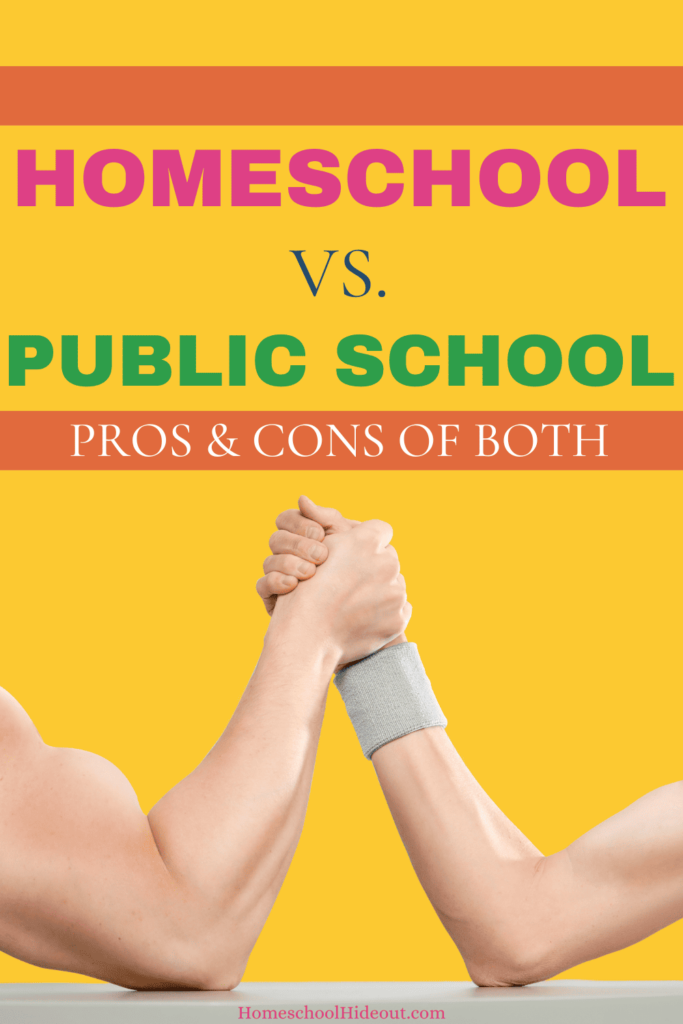
Pros of Homeschooling
Customized learning experience.
Homeschooling allows learners to have a tailor-made learning experience where the curriculum and teaching methods can be adjusted according to their individual needs. This individualized approach often leads to better academic results as students can learn at their own pace and focus on areas that interest them.
Flexible Schedule
Homeschooling offers a flexible schedule, which is beneficial for families who have parents working unconventional hours or students with extracurricular commitments. Families can also plan for vacations during off-peak periods, avoiding the high costs and crowds of traditional school breaks.
Safe Learning Environment
Every child requires a safe learning environment to thrive. Homeschooling provides a safe and secure environment where parents can actively monitor their child’s progress. This type of learning also protects children from bullying and those with anxiety or other social challenges.
Cons of Homeschooling
Limited social interactions.
One of the major drawbacks of homeschooling is the limited social interaction with peers. This can impact the development of social skills and hinder the ability to work in a team.
High Parental Involvement
Homeschooling requires significant parental involvement as they are responsible for creating and implementing the curriculum. This can be overwhelming for parents who have other commitments or who lack the necessary knowledge and skills to effectively teach their child.
Pros of Traditional Schooling
Social life and development.
Schools provide kids with ample time to socialize and interact with their peers, helping them develop important social skills. They also have access to extracurricular activities, clubs, and sports teams that can further enhance their social development.
Access to Numerous Resources
Traditional schools often have a wide range of materials, from textbooks to technology, that students can utilize in their learning. This variety of resources can greatly enhance a student’s understanding and application of concepts.
Trained Teachers
Professional assistance is essential for a child’s education. Traditional schools have trained and experienced teachers who are equipped to handle various learning styles and needs. They also receive ongoing professional development to enhance their teaching skills.
Cons of Traditional Schooling
Bullying and peer pressure.
School environments can expose children to bullying and peer pressure, which can negatively impact their mental health and self-esteem. This can also affect their academic performance.
One-Size-Fits-All Approach
Traditional schooling often follows a standardized curriculum, which may not cater to individual learning styles and needs. This can lead to students feeling disengaged or struggling to keep up with the pace.
It’s evident that both homeschooling vs. traditional schooling have their own set of pros and cons. It ultimately depends on you and your child’s needs, learning styles, and preferences. Ensure that you consider all factors before deciding on the type of education that is right for your child. At the end of the day, what matters most is that your child receives a quality education in a supportive and nurturing environment.
More from my site

Share this:
- Click to share on Facebook (Opens in new window)
- Click to share on Pinterest (Opens in new window)
- Click to share on Twitter (Opens in new window)
- Click to share on Reddit (Opens in new window)
- Click to email a link to a friend (Opens in new window)
- Click to print (Opens in new window)

Homeschooling Vs Traditional Schooling

How Does Homeschooling Compare To Traditional Schooling?
Homeschooling, also known as home education, does exactly what it says on the tin; it is a system of education in which parents elect to keep their children home from school in order to educate them. This is perfectly legal as long as the parents follow the required legal process which involves informing the school and local authority of the decision.
It is important to remember that this legality is only required if the child has previously been in school; in situations where the child has never attended school, parents have no legal obligation to tell the authorities about their decision to home-educate.
Benefits of Homeschooling
The decision to home educate has a range of benefits when compared to traditional schooling methods. It gives the parent greater autonomy and choice over the curriculum, and the subjects studied, allowing them to focus on a preferred path of study. If the student shows particular strengths, interests,s or passion for a specific subject, there is far more flexibility and freedom to pursue this avenue and to tailor a programme of study which suits the needs of the pupil exactly.
In a similar sense, this flexibility extends to the timetable. Home education offers a much more fluid schedule, not constrained by a traditional sequence or time period. Instead, lessons can be structured and addressed in a way that best suits the lifestyle of the family involved, offering a more free and easy approach that can take into account days out, activities, clubs and even trips.
Home education is in many ways a family affair, and many parents cite this as a key reason why they made the decision. It allows the child and parent to spend more time together, making it particularly appealing during adolescence, as families can support one another during what can be a challenging period of the student’s life. Couples can also become closer as a result of the decision, as more time is spent together on a common goal. Some families also believe this strengthens the bond between parent and children, as more time is spent together during the formative years.
Home education can also be an ideal way to help children who may be struggling to achieve or progress, particularly if there are other school avoidance or anxiety issues at play. Parents can adapt their teaching methods to get the best results, and extra time can be spent on concepts that are tricky to grasp. With focused one to one attention, there is less danger of a misunderstanding being overlooked or forgotten, making steady progress more likely. In the same way, if a child appears to be excelling in a particular area, there are no curriculum or scheduling restraints; they can simply power ahead and onto the next topic.
For some parents, their religious or personal beliefs are a large part of their decision to home educate their child; not being bound by a timetable means there is more opportunity to spend time focusing on religious instruction or imparting ethical or moral lessons. Parents in the UK are not required to follow the National Curriculum when homeschooling, and this means there is more scope to follow a set religious lifestyle or belief system which may be restricted by traditional mainstream education.
Benefits of Traditional Schooling
There is no doubt that home education has a range of benefits, and can be a huge help to many students and families. For the sake of balance, however, it is important to consider both sides, and traditional education in a school environment can also offer a number of bonuses to both parents and pupils.
The most apparent advantage to choosing a mainstream school is of course access to a highly trained professional in the form of the teacher. Teachers are required to have a degree and postgraduate qualification in order to practice as a teacher in state schools, and this gives them a high level of not only subject knowledge but best practice and effective pedagogy. They are trained in the best way to teach and deliver information, to inspire and educate children and young people, and to develop and encourage critical thinking and analytical skills to a high level.
Time is another issue when it comes to traditional versus homeschooling . Home education requires a massive amount of commitment and dedication on the part of one or both parents. While some choose to bring in external tutors, this can be expensive, and cannot cover the whole curriculum. School is an environment dedicated to learning, and it is the sole job of the teacher to be there, allowing parents to pursue other commitments such as paid work which may be essential to the family.
Both home education and traditional schooling have pros and cons , and it is important to do your research thoroughly into each side before coming to a decision. Each child is unique, with their own learning style, interests, strengths, and challenges, and will all respond differently to different methods of learning. One of the most essential elements of schooling is to foster and inspire a genuine love of learning which the pupil will carry throughout their lives; the way this is achieved is down to personal preference.
Simon Kensington
Simon Kensington, homeschooling parent and creator of Get Homeschooled, shares insights from over 20 years of educating his three children at home. Balancing work with homeschooling as a single parent, he aims to empower others on this rewarding journey.
Recent Posts
How To Make A Report Card For Homeschool
Key Takeaways Understand the Purpose of a Homeschool Report Card: A homeschool report card serves as a record of a student's academic performance throughout the year. It helps parents track their...
How To Make Homeschool Fun
Key Takeaways 1. Create a Positive Learning Environment: Design a comfortable workspace that encourages learning and creativity. Incorporate hands-on activities that align with your child's interests...

25,000+ students realised their study abroad dream with us. Take the first step today
Meet top uk universities from the comfort of your home, here’s your new year gift, one app for all your, study abroad needs, start your journey, track your progress, grow with the community and so much more.

Verification Code
An OTP has been sent to your registered mobile no. Please verify

Thanks for your comment !
Our team will review it before it's shown to our readers.

- School Education /
Essay on Home Schooling in 150, 250 and 400 words
- Updated on
- Jan 8, 2024

Homeschooling refers to the practice of education at home or any other place outside the school premises. Over the years, the popularity of homeschooling has increased quite a bit. It is much more convenient for both students as well as parents. It saves time, is efficient, and de-stresses children, unlike normal schools that distress children. But just like everything else, along with the pros, homeschooling too has some cons.
A lot of people believe that education in homeschooling is confined to home boundaries only. These students are not able to develop social skills and find it hard to socialise with others. Some of them become introverts too. These are just misconceptions. We have provided below samples of essays on homeschooling. Let’s have a look at them.
This Blog Includes:
Essay on home schooling in 150 words, essay on home schooling in 250 words, essay on home schooling in 400 words.
Also Read:- Importance of Internet
Homeschooling is a concept that has been becoming quite popular over the years. Especially in times of natural calamities and pandemics such as COVID-19, it has gained quite a reputation for being an alternative to traditional schooling. Some of the benefits of homeschooling include convenience for both, children as well as parents. It provides tailor-fit learning education to children as every child has his/her own learning pace.
Homeschooling de-stresses children, unlike schools that distress them. But just like any other thing, homeschooling too has some drawbacks. One of the drawbacks that most concern parents is that their child would not be able to have social interaction. Children need to have social interaction in the early stages of childhood to develop their minds. Hence, it’s up to each child and parent whether to take up homeschooling or not.
One of the aspects that has been gaining quite a lot of attention and popularity is homeschooling. Over the years, it has been gaining quite a reputation of becoming an alternative to traditional schooling. Homeschooling is a good way to deliver tailor-fit education to children as every child has his/her own pace of learning.
So for children who are unable to cope with the pace of school education, homeschooling is a great option for them. Homeschooling is extremely convenient for both, children as well as parents. It saves time and money as well. The children who are homeschooled have to deal with less stress as traditional schooling gives them a lot of stress. By tracking the progress of their child on their own, parents get to understand their child better and hence make necessary adjustments for them.
But just like any other thing, homeschooling too has some drawbacks. One of the major drawbacks is that children who are homeschooled lack social skills. Having social international for children in their early stages of childhood is essential for developing their minds. Children who are homeschooled may even become introverts. Parents might find it stressful for them in the long run to have to homeschool their child if they do it on their own.
They might also not be able to have any time for themselves. Homeschooling is a choice that requires assessing the situation. It might be suitable for some, while others may not find it fit for them. Hence, the decision to homeschool should be made judiciously.
Also Read:- Essay on Pollution
Over these past few years, the concept of homeschooling has gained quite a lot of attention. Especially in a time like the COVID-19 pandemic, it has become an alternative to traditional schooling for many parents. Parents can hire a tutor for the same or can even teach their children themselves. Homeschooling has a lot of pros for both, parents as well as children.
Pros of Home Schooling
Homeschooling is much more convenient than traditional schooling. It also saves commuting time and a little money too given what the situation is. Homeschooling allows parents to tailor-fit education for their child. This is great because every child has his/her own learning pace and this way they can easily cope with the learning. In traditional school, all have to learn at the same pace irrespective of whether or not they are learning.
Also for many students, the school environment can become quite stressful making it difficult for them to get comfortable and hence causing them stress. Homeschooling, on the other, de-stresses children. They are safe from even getting bullied and have the comfort of their own home. Parents get a chance to track their child’s progress and hence, get to know them better. Such a thing generates positivity all around.
Cons of Home Schooling
But just like any other thing, homeschooling too has some drawbacks. One of the major drawbacks that concern parents the most is that their children would not be able to have proper social interactions. Social interactions are very important in the early stages of childhood to develop a child’s mind properly.
Failure in that can even lead to a child becoming introverted. Some of the homeschooled children also face problems in mixing with others. For parents, depending on the situation, homeschooling can turn out to be costly as the tutors they hire may charge high fees from them. Parents may also find that they are not able to have time for themselves, which, in the long, can become quite stressful for them.
The decision of homeschooling shouldn’t be just opted for the convenience of it. Parents should take into account every scenario of their current as well as to some extent, their near future situations to make a correct decision. Hence, it would be fitting to say that the decision to homeschool should be made judiciously.
Related Reads
Homeschooling is much more convenient than traditional schooling. It also saves commuting time and a little money too given what the situation is. Homeschooling allows parents to tailor-fit education for their child. This is great because every child has his/her own learning pace and this way they can easily cope with the learning. In traditional school, all have to learn at the same pace irrespective of whether or not they are learning. Also for many students, the school environment can become quite stressful making it difficult for them to get comfortable and hence causing them stress. Homeschooling, on the other, de-stresses children. They are safe from even getting bullied and have the comfort of their own home. Parents get a chance to track their child’s progress and hence, get to know them better. Such a thing generates positivity all around.
Some of the benefits of homeschooling include convenience for both, children as well as parents. It provides tailor-fit learning education to children as every child has his/her own learning pace. Homeschooling de-stresses children, unlike schools that distress them.
In some aspects, homeschooling is better than traditional schooling. It is more convenient, children can learn at their own pace, it de-stresses them, etc. but on the other hand, it does have some cons too such as no social interaction which can lead to less developed minds, no healthy competition, etc.
This brings us to the end of our blog Essay on Homeschooling. Hope you find this information useful. For more information on such informative topics for your school, visit our essay writing and follow Leverage Edu.
Deepansh Gautam
Leave a Reply Cancel reply
Save my name, email, and website in this browser for the next time I comment.
Contact no. *

Connect With Us

25,000+ students realised their study abroad dream with us. Take the first step today.

Resend OTP in

Need help with?
Study abroad.
UK, Canada, US & More
IELTS, GRE, GMAT & More
Scholarship, Loans & Forex
Country Preference
New Zealand
Which English test are you planning to take?
Which academic test are you planning to take.
Not Sure yet
When are you planning to take the exam?
Already booked my exam slot
Within 2 Months
Want to learn about the test
Which Degree do you wish to pursue?
When do you want to start studying abroad.
January 2024
September 2024
What is your budget to study abroad?

How would you describe this article ?
Please rate this article
We would like to hear more.
Have something on your mind?

Make your study abroad dream a reality in January 2022 with
India's Biggest Virtual University Fair

Essex Direct Admission Day
Why attend .

Don't Miss Out

Homeschool Gear
Understanding the Pros and Cons of Homeschooling vs. Traditional Schooling
As an Amazon Associate I earn from qualifying purchases.
Defining Homeschooling and Traditional Schooling
In the great debate of homeschooling versus traditional schooling, it’s important to understand the fundamental principles of both education methods. In this section, we’ll provide a brief overview of homeschooling and traditional schooling, as well as discuss the evolution of both approaches.
Brief Overview of Homeschooling
Homeschooling, as the name suggests, is a method of education in which parents or guardians take on the responsibility of teaching their children at home rather than sending them to traditional schools. This alternative approach has gained popularity over the years, with parents attracted to the flexibility and the ability to tailor education to their child’s specific needs. Homeschooling allows for one-on-one instruction and the opportunity to focus on subjects that spark a child’s interest, ultimately fostering a love for learning.
Brief Overview of Traditional Schooling
Traditional schooling , on the other hand, is the more common education system in which children attend public or private schools. These institutions adhere to a specific curriculum, have set schedules, and provide kids with the opportunity to socialize and interact with their peers. Traditional schools often have standardized testing and a more structured approach to learning, which can be advantageous for children who thrive in this type of environment. However, some argue that the “one size fits all” approach of traditional schooling might not cater to individual learning styles or foster creativity and curiosity in the same way homeschooling does.
Evolution of Both Education Methods
Throughout history, education has continuously evolved to meet the diverse needs of society. In the early years of American education, homeschooling was the primary method for teaching children as there were no formal schools in place. As the country began to establish institutions for education, traditional schooling started taking center stage, and homeschooling became a less popular choice.
However, in recent years, homeschooling has experienced a resurgence as more families seek alternatives to the standard education model. With the explosion of technology and access to online resources, homeschooling now has a vast array of additional educational tools and curriculum choices that can supplement parents’ teaching efforts.
Similarly, traditional schools have also adapted to the ever-changing landscape. With the rise of educational technology, schools are integrating more digital resources and individualized learning methods into their curriculum to better cater to the diverse needs of students. Some schools are also placing a heavier emphasis on fostering creativity and critical thinking to ensure students are well-equipped for their future careers.
In conclusion, both homeschooling and traditional schooling have evolved to adapt to the changing educational landscape. Each approach offers unique benefits and challenges, and it’s essential for parents to consider their child’s learning preferences, strengths, and weaknesses when choosing the most appropriate educational path.
The Pros and Cons of Homeschooling
Tailored curriculum and learning pace.
One of the most significant benefits of homeschooling is the ability to tailor the curriculum to your child’s unique needs and interests. This personalized approach allows your child to learn at their own pace and ensures that the learning process is engaging and enjoyable. In a traditional school setting, it’s impossible to cater to every student’s individual needs, but homeschooling provides flexibility and individualized attention that can be extremely beneficial for some learners.
Flexible schedules and family time
Another major advantage of homeschooling is the freedom it offers in terms of scheduling. With homeschooling, there’s no need to adhere to a strict daily schedule, which can be especially helpful for families with busy or irregular workdays. This flexibility allows for more quality family time, which is often lacking in today’s fast-paced society. Additionally, it provides opportunities for children to participate in extracurricular activities, pursue hobbies, and travel, without the constraints of a traditional school calendar.

Control over socialization and environment
Homeschooling also gives parents a great deal of control over their child’s socialization and learning environment. With homeschooling, you can decide who your child spends time with and ensure that they are surrounded by positive influences. In addition, you can create a nurturing and supportive environment that encourages your child to grow, learn, and express themselves freely.
Cons of homeschooling: Isolation and social skill development
While homeschooling offers control over socialization, it can sometimes lead to isolation and hinder a child’s social skill development. Traditional schools provide ample opportunities for students to interact with peers, make friends, join clubs, and engage in group activities, which are essential for developing social skills. Although homeschooling can still provide social opportunities, parents must be proactive in seeking them out and ensuring their child has regular social interaction with other children.
Cons of homeschooling: Lack of resources and support
Traditional schools typically offer a wealth of resources and support for students, such as libraries, technology facilities, and guidance counselors. Homeschooling families often have to provide these resources themselves, which can be challenging and costly. Additionally, it can be difficult for homeschooling parents to navigate the world of education without the support of experienced teachers and administrators.
Cons of homeschooling: Parental time commitment and potential burnout
One of the most significant challenges of homeschooling is the immense time commitment it requires from parents. In addition to teaching, parents must plan and prepare lessons, research educational resources , and manage their child’s academic progress. This can be exhausting and can lead to burnout for some parents. It’s essential to strike a balance between homeschooling and other aspects of life to avoid burnout and ensure a successful homeschooling experience.
The Pros and Cons of Traditional Schooling
Structured curriculum and schedules.
One of the significant advantages of traditional schooling is that it offers a structured curriculum and schedule. This means that students have predetermined learning goals and a roadmap to achieve them. Moreover, a consistent schedule drives discipline and time management skills — important life skills that will come in handy throughout a student’s life.
Socialization and extracurricular activities
Traditional schools provide plenty of opportunities for socializing and engaging in extracurricular activities. Students not only learn to interact with their peers but also forge lifelong friendships and develop essential social skills. Extracurricular activities such as sports, clubs, and school events help students explore different facets of their personality and discover interests outside the classroom.
Specialized resources and teachers
In traditional schools, students usually have access to specialized resources and teachers, including science labs, sports facilities, counselors, and libraries. These resources pave the way for thorough and diverse learning experiences. Having qualified teachers and support staff ensures that students receive the guidance they need to navigate their educational journey successfully.
Cons of traditional schooling: One-size-fits-all approach
On the flip side, some disadvantages come with traditional schooling. One of the significant drawbacks is the one-size-fits-all approach that’s often employed in classrooms. This may not meet the unique needs of each student, making it difficult for some to succeed in a traditional school environment. For instance, students who learn at a slower or faster pace than their peers may find it challenging to keep up or may feel unchallenged.
Cons of traditional schooling: Peer pressure and bullying
In a traditional school setting, there can be instances of peer pressure and bullying. While schools do take measures to address these issues, it’s important to recognize that they may be more prevalent in such environments than in homeschooling settings. Children and teens might feel pressured to conform or engage in risky behaviors to fit in or avoid bullying.
Cons of traditional schooling: Limited parental involvement
Lastly, traditional schooling might limit parental involvement in a child’s educational journey. Parents may not have the flexibility to tailor the curriculum to their child’s specific interests or address intellectual curiosity beyond the classroom. Additionally, parents sometimes have less control over who their child interacts with and the values and philosophies imparted by educators.
Which Method of Education Is Best For Your Child?
As parents, we always want the best for our children, and that includes their education. With more families considering homeschooling as an alternative to traditional schooling, it can be challenging to decide which method is best for your child. In this article, we’ll discuss various factors to consider before making a decision, ranging from your child’s individual needs to your family’s lifestyle and priorities.
Considering your child’s individual needs
Every child is unique, and their educational needs are no exception. When deciding between homeschooling and traditional schooling, consider your child’s learning style, social skills, and special needs or learning disabilities.
Homeschooling can offer a more flexible and personalized learning experience, allowing you to tailor lessons to your child’s specific needs and interests. On the other hand, traditional schooling provides a more structured environment, which some children may benefit from. Additionally, traditional schools often have resources and trained professionals available to support students with special needs.
Evaluating your family’s lifestyle and priorities
Your family’s lifestyle and values play a significant role in determining the best educational method for your child. Homeschooling requires a significant time commitment from at least one parent, who may need to become the primary educator. This can be difficult for families with two working parents or those who aren’t willing or able to dedicate the necessary time.
On the other hand, traditional schooling can provide more structure and free time for parents. However, it also means less control over your child’s daily experiences and values imparted by teachers and peers in school. As a family, discuss your priorities and values to help decide which educational method aligns best with your collective goals.
Assessing financial and time investment
Homeschooling can be both time-consuming and costly. In addition to becoming the primary educator, parents often need to purchase curriculum materials, educational resources , and provide extracurricular opportunities for their homeschooled child. On the flip side, homeschooling can potentially save money in the long run by avoiding private school tuition fees, transportation costs, and other expenses associated with traditional schooling.
Traditional schooling, especially public schools, often come at little cost to the families (besides school supplies and extracurricular fees). But as we touched on earlier, this method also requires less time commitment from parents. Weigh the financial and time investments required for each educational method before making a decision.
Are you prepared to take on the role of a homeschool teacher?
Homeschooling can be incredibly rewarding, as it provides the opportunity to be directly involved in your child’s education. However, it comes with its own set of challenges. As a homeschooling parent , you’ll need patience, creativity, and adaptability to ensure your child receives a well-rounded education.
Before embarking on this journey, evaluate your ability and willingness to take on the role of a homeschool teacher. Consider attending workshops, joining homeschooling support groups, and researching various homeschooling curriculums to help you feel more prepared and confident.
Determining your child’s academic goals and objectives
Lastly, consider your child’s long-term academic goals and objectives. Are you aiming for a rigorous college-preparatory education, or is a more relaxed, self-paced learning experience more suitable for your child? Keep in mind that homeschooling curriculums can be as diverse and rigorous as traditional schools, and homeschooled children often excel in college and beyond.
Whatever decision you make, remember that your child’s education is a lifelong journey, and there’s always room for experimentation and change. Keep evaluating your child’s needs and adjust your educational choices accordingly to ensure that they are learning, growing, and thriving on their path to success.
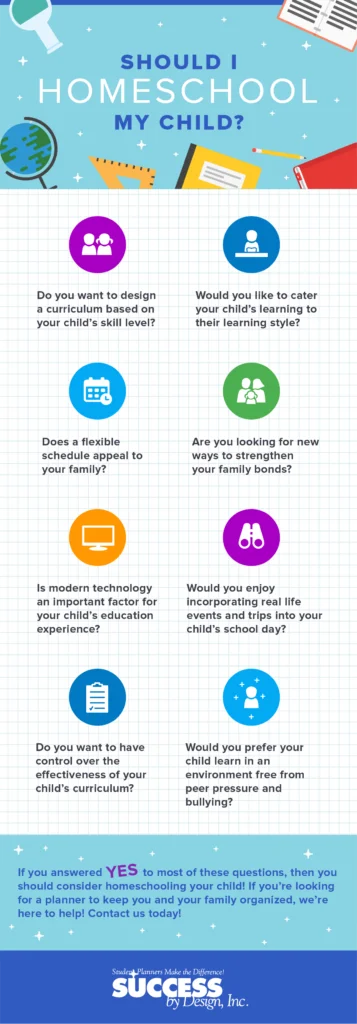
Transitioning Between Homeschooling and Traditional Schooling
Transitioning between homeschooling and traditional schooling can be quite the challenge, and it’s undoubtedly a significant decision for families. To better navigate this process, let’s take a closer look at the factors involved in both transitioning from homeschooling to traditional schooling and transitioning from traditional schooling to homeschooling. Plus, we’ll discuss adapting to new environments and expectations so that you have a better understanding.
Transitioning from homeschooling to traditional schooling
For students who have been homeschooled, stepping into the world of traditional schooling can be daunting. But don’t worry, it’s completely normal to feel this way!
First, consider the academic adjustments. Homeschooled students may find that the curriculum of traditional schools is either too challenging or too easy, depending on what they have been used to. This might require some additional tutoring or communication with the teachers to ensure the student’s success.
Next, socialization plays a huge role. Being used to one-on-one interactions at home, it could be overwhelming to suddenly deal with a crowd of classmates. Encourage your child to participate in extracurricular activities or clubs to create social connections and ease their transition.
Lastly, time management will be critical when making the switch. Traditional schools have more structured schedules, and it may take a while for your child to adjust.
Transitioning from traditional schooling to homeschooling
On the flip side, transitioning from traditional schooling to homeschooling has its own set of challenges.
First, setting up and organizing a homeschooling environment can take some time. It’s essential to find the right curriculum and learning materials to create the ideal learning experience for your child.
Secondly, there may be an adjustment period for your child in terms of socializing. A homeschooling community is not a bad idea to consider, it offers socializing opportunities and collaborative learning experiences.
Lastly, be prepared for a change in your family dynamics. With parents taking on the role of teachers, maintaining a healthy balance between the two roles is critical.
Adapting to new environments and expectations
Whether you’re transitioning from homeschooling to traditional schooling or vice versa, adapting to new environments and expectations can be challenging but not impossible. Allow some time for adjustment, and consider the following steps:
- Communicate with your child about the change and their feelings.
- Set realistic expectations for both you and your child.
- Keep an open line of communication with teachers, counselors, or fellow homeschooling parents.
- Be patient, and remember that both you and your child need time to adapt to the new situation.
Social and academic support systems
Don’t forget about the importance of social and academic support systems during any transition. Encourage your child to participate in clubs, sports, or other extracurricular activities to create a sense of belonging. For homeschooled students, joining a homeschooling community or cooperative can provide similar opportunities for socialization and learning from others.
Academically, be in tune with your child’s needs. If your child struggles with a particular subject or is gifted in another, look into options like tutoring, advanced classes, or learning resources to support their development and growth.
Remember, transitioning between homeschooling and traditional schooling is a significant change, and it requires patience, support, and understanding from everyone involved. Be open to recognizing potential challenges and addressing them accordingly, and you will provide a smooth transition for your child and your family.
The Role of Parents in Homeschooling and Traditional Schooling
Parents as educators in homeschooling.
In the world of homeschooling, parents take on the lion’s share of responsibility when it comes to educating their children. They are the ones who plan the curriculum, research resources, and set the daily schedule for learning. This can be both rewarding and challenging at the same time.
On the one hand, parents can tailor the education to their child’s specific needs and learning style. For instance, if your child is passionate about art or science, you can place more emphasis on those subjects and explore them more deeply. Additionally, homeschooling allows for flexibility in scheduling, meaning you can take advantage of educational opportunities outside the traditional school calendar – such as field trips or workshops – that might not otherwise be feasible.
On the other hand, being your child’s educator comes with its fair share of challenges. For starters, the time commitment is significant, and it can sometimes feel as though there just aren’t enough hours in the day to cover everything. Furthermore, homeschooling parents must be prepared to continuously learn themselves, as they may need to teach subjects that they are not experts in or haven’t studied in years.
Parents as advocates in traditional schooling
For parents who opt for traditional schooling, their role shifts from being the primary educator to being an advocate for their child’s learning. This involves staying informed about what is happening in the classroom and ensuring that their child’s needs are being met.
Parents should actively participate in Parent-Teacher Associations (PTAs), attend parent-teacher conferences, and stay up-to-date with school policies. This allows them to not only be aware of their child’s academic progress, but also to voice their concerns or advocate for their child when necessary.
Building a strong parent-teacher partnership
Regardless of whether your child is homeschooled or attends traditional school, it’s crucial to establish a strong relationship with their educators. For homeschooling parents, this might involve connecting with other homeschooling families in their area, participating in homeschool co-ops, or seeking guidance from mentors in the homeschooling community.
For parents of children in traditional schools, fostering open communication with their child’s teacher is key. It’s important to get to know the teacher early in the school year and maintain an ongoing dialogue about your child’s progress, strengths, and challenges. When concerns arise, address them promptly and collaborate with the teacher to find solutions that support your child’s learning.
Regular communication and involvement with your child’s education journey
One common thread that weaves through both homeschooling and traditional schooling is the importance of parents being consistently involved in their child’s education. By staying engaged and informed, parents can help ensure that their child receives the right support, encouragement, and resources to succeed academically.
For homeschooling parents, involvement might look like researching new teaching strategies, seeking feedback from their child on the learning process, or even attending workshops or conferences to expand their own knowledge about education.
For parents with children in traditional schools, involvement can include helping with homework, volunteering in the classroom, or simply staying aware of what’s happening in the school and being proactive about addressing any concerns.
Ultimately, the success of your child’s education – whether it be through homeschooling or traditional schooling – relies heavily on your dedication and involvement as a parent. By being informed, communicative, and proactive, you can help set your child on the path to a fruitful and enriching educational experience.
The Impact of Homeschooling and Traditional Schooling on Career Opportunities
One of the important factors to consider when choosing between homeschooling and traditional schooling is the effect each will have on future career opportunities. Let’s delve into how colleges and employers view homeschooling, the advantages homeschoolers might have in entrepreneurial careers, and the benefits of career preparedness and networking opportunities that traditional schooling can offer.
Do colleges and employers view homeschooling differently?
When it comes to college admissions, homeschooling won’t necessarily put your child at a disadvantage. In fact, many colleges and universities are increasingly recognizing and valuing the unique experiences that homeschoolers bring. As long as the homeschooled student can provide proper documentation and meet the required criteria, such as standardized test scores, a well-prepared transcript or portfolio, and a diploma or GED, they should have just as much chance of being accepted as their traditionally schooled peers.
However, perception can be a different story when it comes to employers. While many companies are becoming more open to hiring homeschooled individuals, there may still be some who harbor misconceptions about the quality of education homeschoolers receive. It’s up to the homeschool graduate to demonstrate their knowledge, skills, and experience in the job application process, just like anyone else.
Advantages of homeschoolers in entrepreneurial careers
Homeschooled individuals often possess unique qualities that make them well-suited for entrepreneurial careers. Given their self-directed learning experiences, they are used to taking charge and problem-solving. They’re also more likely to have developed time management skills and adaptability, which are essential traits for entrepreneurs.
Moreover, while traditional schooling might offer specific career-oriented classes, homeschooling offers the flexibility to tailor the curriculum to your child’s interests and passions. This personalized approach can help them to develop a deeper understanding and love for their chosen field, which can be an advantage when pursuing a entrepreneurial career.
Career preparedness and networking opportunities in traditional schooling
One of the strengths of traditional schooling is the structure and resources it provides students when preparing for future careers. Traditional schools often have established relationships with local businesses and organizations, allowing for more job-shadowing, internship, and co-op opportunities. These experiences can help students to understand the ins and outs of various professions, setting them on a path toward a successful career.
Meanwhile, networking is often an integral part of traditional schooling. Students are exposed to a wider social circle that includes teachers, coaches, counselors, and peers who can offer valuable connections, references, and advice as they navigate the job market. In addition, extracurricular activities like clubs, sports, and student government provide opportunities for students to develop their teamwork, communication, and leadership skills—all of which are essential for a successful career.
To sum it up, both homeschooling and traditional schooling have their own unique benefits and challenges when it comes to preparing students for the world of work. Ultimately, the right choice will depend on the specific needs, goals, and preferences of your child, as well as the resources and support available to you as a family.
Frequently Asked Questions
What are the core differences between homeschooling and traditional schooling.
The main differences between homeschooling and traditional schooling lie in the learning environment, curriculum, and social interactions. In homeschooling, learning takes place at home or in a chosen location, with the child’s education being guided by the parents or a private tutor. Traditional schooling, on the other hand, takes place in brick-and-mortar schools with a predetermined classroom setting, curriculum, and schedule.
Which education method has better academic outcomes?
Both homeschooling and traditional schooling methods can lead to successful academic outcomes, but it ultimately depends on the individual student, the quality of instruction, and the support the child receives. There are studies showing the academic benefits of both methods, so it’s essential to assess your child’s learning style, needs, and preferences when making this decision.
How do I know if homeschooling is right for my child?
To determine if homeschooling is right for your child, consider factors such as their learning style, interests, and social needs. Additionally, evaluate your own ability to commit to the time, resources, and planning necessary for successful homeschooling . It’s also important to consider the support and resources available in your community, such as homeschooling groups and educational materials.
What qualifications do I need to homeschool my child?
The qualifications for homeschooling a child varies by location. In some areas, no specific qualifications are required, while in others, a teacher’s certification or educational background in a relevant subject area might be necessary. Research the homeschooling requirements in your area to ensure you have the appropriate qualifications.
How can I ensure my homeschooled child receives a well-rounded education?
To provide a well-rounded education for your homeschooled child, make sure to cover core subjects such as math, science, language arts, and social studies. Additionally, incorporate opportunities for physical education, art, and music into their curriculum. Seek out resources and support from homeschooling organizations, local groups, and online forums to enhance their learning experience.
What are the legal requirements for homeschooling in my area?
Legal requirements for homeschooling vary depending on your location. Some areas require homeschooling families to follow specific guidelines, such as submitting annual reports and standardized testing results, while others may be more lenient. Research the specific laws and regulations in your region to ensure you’re in compliance with local requirements.
How does homeschooling impact a child’s social interactions?
Homeschooling can have a variety of effects on a child’s social development, depending on the opportunities for social interaction that parents provide. Some homeschooled children may have fewer opportunities for socialization compared to their traditionally schooled peers; however, many homeschooling families prioritize social activities such as co-ops, field trips, and group classes to ensure their children have access to social interaction.
Can homeschooled students participate in extracurricular activities or sports?
In many cases, homeschooled students can participate in extracurricular activities and sports through local schools, homeschooling organizations, and community programs. Some areas have restrictions on homeschooled students participating in public school programs, so it’s important to research the opportunities and restrictions in your area.
How do colleges and universities view homeschooled applicants?
Many colleges and universities recognize the value of a homeschool education and treat homeschooled applicants the same as those from traditional schools. Admissions requirements for homeschooled students may vary, so it’s important to research the specific requirements at each college or university your child is interested in attending.
What support and resources are available for homeschooling families?
There are numerous support and resources available for homeschooling families, ranging from online forums and local homeschooling groups to educational materials and curriculum providers. National and regional homeschooling organizations can also provide guidance, advocacy, and support for homeschooling families. Don’t hesitate to seek out these valuable resources as you embark on your homeschooling journey.
Amazon and the Amazon logo are trademarks of Amazon.com, Inc, or its affiliates.
By homeschoolmomma
Related post, the power of homeschooling co-ops: enhancing learning together, finding the perfect fit: choosing the right homeschool co-op, building connections: the benefits of homeschooling co-op communities, leave a reply cancel reply.
Your email address will not be published. Required fields are marked *
Save my name, email, and website in this browser for the next time I comment.
Tips for Juggling Different Grade Levels in Homeschooling

Homeschooling vs. Traditional Schooling: Making The Right Choice For Your Child
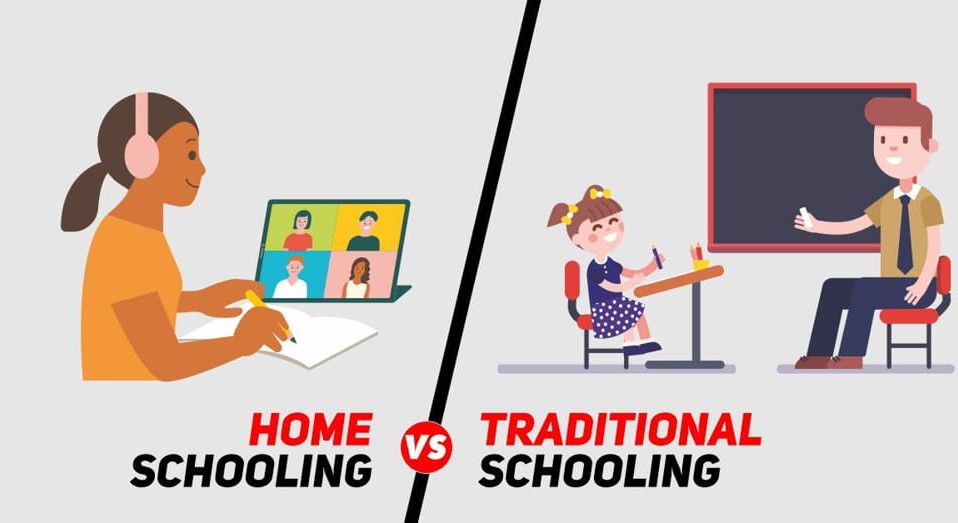
As parents, one of the most critical decisions we must make is choosing the right educational path for our children. The foundation of a child’s learning experience can significantly impact their future academic success, personal growth, and overall well-being. Today, parents are faced with various options to ensure their children receive the best education possible. Among these options, homeschooling and traditional schooling stand out as the most prevalent and widely debated choices. This article aims to provide an in-depth comparison of homeschooling and traditional schooling, emphasizing the importance of making an informed decision for your child’s unique needs and circumstances.
Homeschooling has gained popularity in recent years as an alternative to the conventional classroom setting. It allows parents to take a hands-on approach to their children’s education, tailoring the curriculum and learning pace to each child’s abilities and interests. With the flexibility and customization homeschooling offers, many families are attracted to this option as a way to ensure their children receive a well-rounded and personalized education.
On the other hand, traditional schooling has long been the standard for education, offering a structured environment, tried and tested curriculum, and a range of resources and extracurricular activities. Proponents of traditional schooling argue that the socialization opportunities , established standards, and educational support provided by schools are crucial for a child’s development.
The debate between homeschooling and traditional schooling is not a simple one, as each option has its advantages and disadvantages. As parents, it’s essential to understand that every child is unique, and what may work for one may not necessarily be the best fit for another. This article will delve into the pros and cons of each educational option, the factors to consider when making a decision, and real-life case studies to help parents make an informed choice that aligns with their child’s needs, their family’s values, and the resources available to them.
Ultimately, the goal is to empower parents with the knowledge and insights necessary to make the right choice for their child’s education, ensuring a strong foundation for future success and personal growth.
Homeschooling
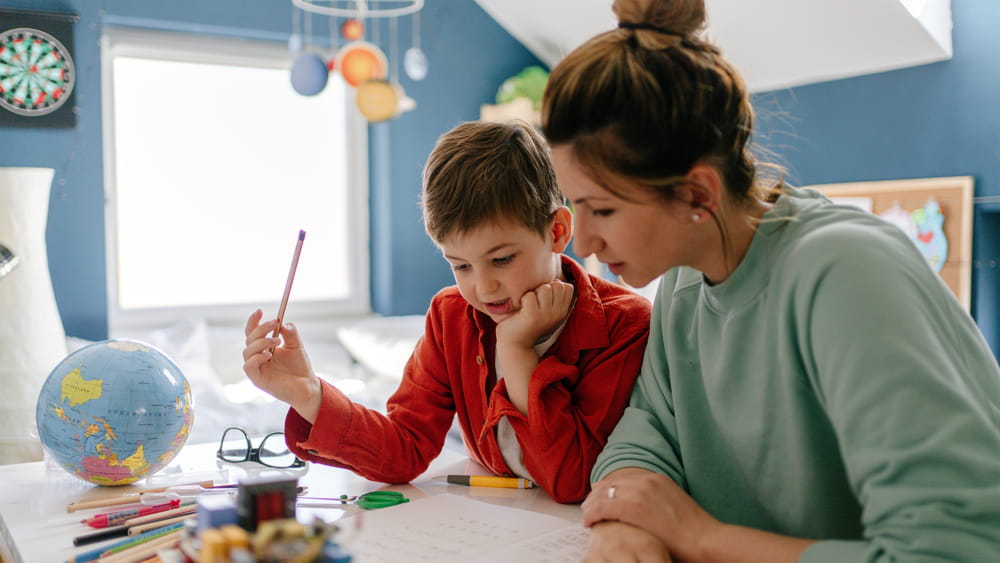
Homeschooling, as an educational alternative to traditional schooling, has a rich history that can be traced back to the early days of formal education. In fact, many historical figures, such as George Washington, Thomas Jefferson, and Abraham Lincoln, were homeschooled. Although the advent of public schools in the 19th century made traditional schooling more widespread, homeschooling has continued to thrive, albeit on a smaller scale, throughout the years.
In the 1960s and 1970s, the modern homeschooling movement began to gain traction in response to the perceived shortcomings of the public school system. Educational reformers like John Holt and Raymond Moore advocated for a more individualized, child-centered approach to learning that prioritized the unique needs and interests of each student. As a result, homeschooling gained popularity among parents who sought a more personalized educational experience for their children.
Today, homeschooling is a legally recognized educational option in many countries, including the United States, the United Kingdom, Canada, Australia, and several European nations. The number of homeschooling families continues to grow, with an estimated 2.5 million children being homeschooled in the United States alone as of 2019. This increase in popularity can be attributed to various factors, such as dissatisfaction with traditional schooling, the desire for more family time, and the flexibility to accommodate a child’s unique learning needs or extracurricular pursuits. Homeschooling methods are as diverse as the families who choose this educational path. Some of the most common approaches include:
Classical Education
This method is based on the Trivium, which consists of three stages of learning: grammar, logic, and rhetoric. It emphasizes the development of critical thinking skills, mastery of language, and a deep understanding of history and literature.
Charlotte Mason
This approach, developed by the British educator Charlotte Mason, focuses on a child’s natural curiosity and emphasizes the use of “living books” (i.e., literature that engages the reader and sparks the imagination), nature studies, and the arts.
Unschooling
Unschooling is a learner-centered approach that encourages children to explore their interests and learn at their own pace, without a structured curriculum or formal lesson plans. This method, which is rooted in the belief that learning is a natural and organic process, often involves a great deal of hands-on exploration and real-world experiences.
Many homeschooling families choose to adopt an eclectic approach, combining elements from various educational philosophies and curricula to create a customized learning plan tailored to their child’s unique needs and interests.
The decision to homeschool is a deeply personal one, and the reasons families choose this path are as varied as the methods they employ. However, the growing popularity of homeschooling is a testament to its effectiveness as an alternative to traditional schooling, offering parents the opportunity to provide their children with a personalized, flexible, and enriching educational experience.
Traditional Schooling

Traditional schooling, as we know it today, has its roots in the establishment of formal education systems that emerged during the late 18th and early 19th centuries. The concept of universal education, where all children receive a standardized education regardless of their social or economic background, was a revolutionary idea that gained momentum during the Industrial Revolution. The United States, the United Kingdom, and many European countries began to develop public school systems designed to educate large numbers of children in an organized and structured manner.
Over time, the traditional school system has evolved to include a standardized curriculum, grade levels, and compulsory attendance laws. Most schools today follow a structured schedule with designated periods for various subjects, such as mathematics, language arts, science, and social studies. This approach is intended to provide a well-rounded education that equips students with a solid foundation of knowledge and skills, preparing them for higher education or the workforce.
One of the primary roles of traditional schools is to foster a sense of community and socialization among students. Schools serve as a microcosm of society, where children learn to interact with their peers, develop social skills, and build relationships with teachers and other authority figures. Extracurricular activities, such as sports, clubs, and performing arts, further contribute to a student’s personal growth and development, offering opportunities to explore interests and talents outside the classroom.
Traditional schooling also plays a vital role in shaping societal values and promoting civic-mindedness. Public schools often emphasize the importance of citizenship, democracy, and cultural diversity, encouraging students to become active and responsible members of their communities. Additionally, schools serve as a platform for identifying and nurturing young talent, providing resources and guidance to help students reach their full potential.
However, despite its many advantages, the traditional school system has faced criticism from those who believe it is outdated and lacks the flexibility needed to meet the diverse needs of today’s students. Some argue that the standardized curriculum and testing methods fail to account for individual learning styles and can stifle creativity, leading to disengagement and decreased academic performance. The large class sizes and limited resources in many schools also raise concerns about the quality of education and the ability to provide personalized attention and support to each student.
Advantages of Homeschooling
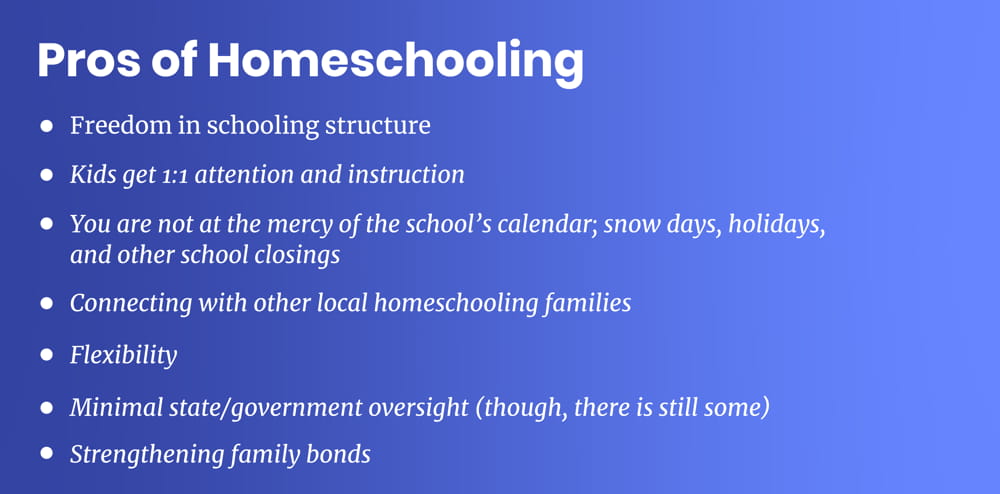
Homeschooling has increasingly become a popular choice for families seeking an alternative to traditional schooling. There are several advantages to homeschooling that make it an attractive option for many parents and students. Some of the most significant benefits include personalized learning, flexibility, strong family bonds, and more.
Personalized Learning
One of the most notable advantages of homeschooling is the ability to tailor the educational experience to the unique needs, interests, and learning styles of each child. In a traditional school setting, teachers must cater to the needs of a diverse group of students, making it difficult to provide individualized attention and adapt lessons to suit every child’s learning style. Homeschooling allows parents to design a curriculum that aligns with their child’s strengths and weaknesses, ensuring that they receive the support and resources needed to excel academically. This personalized approach can lead to increased engagement, improved comprehension, and a more profound love for learning.
Flexibility
Homeschooling offers a level of flexibility that traditional schooling cannot match. Families can set their own schedules, allowing for a better balance between academics, extracurricular activities, and family life. This flexibility can be particularly beneficial for students with unique needs, such as those with learning disabilities, medical conditions, or demanding athletic or artistic pursuits. By creating a customized schedule, parents can ensure that their children receive the necessary support and accommodations to thrive both academically and personally.
Strong Family Bonds
Homeschooling provides families with ample opportunities to spend quality time together, fostering strong relationships and enhancing communication. Parents play an active role in their children’s education, allowing them to be more involved in their child’s academic progress and personal growth. This involvement can lead to a deeper understanding of their child’s needs, strengths, and challenges, enabling them to provide more effective guidance and support. Moreover, siblings who are homeschooled together often develop close relationships, as they share educational experiences and learn from one another.
Safe And Supportive Environment
For some families, homeschooling provides a safe and supportive environment that may not be available in a traditional school setting. Bullying and negative peer pressure can significantly impact a child’s well-being and academic performance. By homeschooling, parents can create a nurturing and positive atmosphere that is conducive to learning and personal growth. Additionally, homeschooling allows parents to instill their values and beliefs in their children’s education, ensuring that the learning experience aligns with the family’s principles.
Mastery-Based Learning
Homeschooling allows for a mastery-based approach to education, where students can progress at their own pace, mastering one concept before moving on to the next. This method contrasts with traditional schooling, where students often advance through the curriculum based on a predetermined timeline, regardless of their mastery of the material. Homeschooling ensures that children have a solid understanding of each subject before moving forward, which can lead to improved academic performance and long-term retention of knowledge.
Encouragement of Independent Thinking And Creativity
Homeschooling encourages independent thinking and creativity by allowing children to explore their interests and passions in depth. Without the constraints of a standardized curriculum, homeschooled students can dive into subjects that intrigue them, fostering a love for learning and developing critical thinking skills. This freedom to explore can also spark creativity, as children have the opportunity to approach problems and concepts from various angles, rather than adhering to a single prescribed method.
Reduced Stress And Pressure
Many students in traditional schools face immense stress and pressure to perform well academically and conform to societal expectations. Homeschooling can alleviate some of this stress by allowing children to learn at their own pace and focus on their personal growth, rather than constantly comparing themselves to their peers. This reduction in stress can lead to improved mental health and a more positive attitude towards learning.
Access to Diverse Educational Resources
In today’s digital age, homeschooling families have access to a wide array of educational resources, such as online courses, virtual field trips, educational apps, and more. These resources can supplement and enhance the homeschooling experience, providing students with diverse learning opportunities that may not be available in a traditional school setting.
Disadvantages of Homeschooling

While homeschooling can offer several advantages, it is essential to consider the potential disadvantages and challenges that may accompany this educational choice. Some of the most notable drawbacks include lack of socialization, time commitment, and potential gaps in education, among others.
Lack of Socialization
One of the primary concerns regarding homeschooling is the potential for limited social interaction with peers. Traditional schools provide ample opportunities for students to develop social skills, engage in group activities, and form friendships. In contrast, homeschooling families may need to make a concerted effort to ensure their children have regular social experiences. Although many homeschooling groups and co-ops organize social events and activities, it may still be challenging for homeschooled students to form connections with a diverse group of peers.
Time Commitment
Homeschooling can be time-consuming for both parents and students. Parents must dedicate a significant amount of time to lesson planning, teaching, and assessing their child’s progress. This responsibility can be particularly demanding for working parents or those with multiple children. Students, too, may need to invest additional time in their education, as they may not have access to the same resources and support systems found in traditional schools.
Potential Gaps in Education
Although homeschooling allows for a personalized and flexible curriculum, there is a risk of potential gaps in education if parents do not have a comprehensive understanding of all subjects. Parents may inadvertently omit essential topics or concepts, resulting in an incomplete educational experience for their children. Additionally, some parents may not feel confident in their ability to teach certain subjects, such as advanced mathematics or science, which may necessitate outsourcing to tutors or online courses.
Limited Access to Extracurricular Activities
Traditional schools often offer a variety of extracurricular activities, such as sports, clubs, and performing arts programs, that can enrich a student’s educational experience and foster personal growth. Homeschooled students may have limited access to these opportunities, which can impact their ability to explore new interests, develop talents, and build social connections.
Financial Considerations
Homeschooling can be a financial burden for some families, as parents must bear the cost of educational materials, resources, and potential loss of income due to the time commitment required for teaching. While public schools provide these resources at no additional cost, homeschooling families must carefully budget and plan for these expenses.
Reduced Independence For Parents
Parents who choose to homeschool often experience reduced independence, as they must balance their personal and professional responsibilities with their role as an educator. This lack of independence can be challenging, especially for parents who are accustomed to pursuing their careers or interests outside of the home.
Transitioning to Traditional School or College
Homeschooled students may face challenges when transitioning to a traditional school or college environment. These challenges can include adapting to a structured schedule, navigating social dynamics, and meeting the unique academic expectations of higher education institutions. While many homeschooled students successfully make this transition, it is essential for parents to provide guidance and support throughout the process.
Legal Requirements And Regulations
Homeschooling families must navigate various legal requirements and regulations, which can vary significantly by region. These regulations may include mandatory standardized testing, curriculum approval, and record-keeping, among others. Compliance with these requirements can be time-consuming and, in some cases, restrictive to the homeschooling experience.
Advantages of Traditional Schooling
Traditional schooling has been the standard for education for centuries, and while alternative options like homeschooling have gained popularity in recent years, there are still several distinct advantages to attending a traditional school. Some of the most notable benefits include socialization, extracurricular activities, access to resources, and more.
Socialization
One of the most significant advantages of traditional schooling is the opportunity for socialization. In a traditional school setting, students interact with a diverse group of peers, allowing them to develop essential social skills, build friendships, and learn to work collaboratively. These experiences not only contribute to a well-rounded education but also prepare students for adulthood, as they learn to navigate various social situations and establish connections with others.
Extracurricular Activities
Traditional schools often provide a wide range of extracurricular activities that can enhance a student’s educational experience and personal growth. From sports teams and clubs to performing arts programs and community service organizations, students have numerous opportunities to explore their interests, develop new skills, and connect with like-minded peers. These activities can also contribute to a student’s overall well-being, promoting physical health, emotional resilience, and a sense of belonging.
Access to Resources
Traditional schools typically offer access to various resources that may not be readily available to homeschooling families. These resources can include well-equipped classrooms, science labs, libraries, and athletic facilities, among others. Additionally, traditional schools often provide support services such as guidance counseling, special education programs, and tutoring, which can be invaluable for students who require additional assistance in their academic pursuits.
Professional Instruction
In traditional schools, students receive instruction from qualified teachers who have undergone rigorous training and certification in their subject areas. These educators bring a wealth of knowledge and experience to the classroom, ensuring that students receive a comprehensive and well-rounded education. Furthermore, teachers can provide valuable feedback and guidance, helping students to identify areas for improvement and develop effective learning strategies.
Structured Learning Environment
Traditional schools provide a structured learning environment, with set schedules, clear expectations, and established routines. This structure can be beneficial for many students, as it fosters a sense of stability and predictability, allowing them to focus on their academic goals. Moreover, the routine of attending school each day helps to instill discipline and time-management skills, which can be essential for success in higher education and the workforce.
Academic Accountability
Traditional schools often implement standardized testing and assessment methods to measure student performance and ensure academic accountability. These assessments can help identify areas where a student may be struggling, allowing educators to intervene and provide targeted support. In addition, standardized testing can serve as a benchmark, enabling parents and students to track academic progress and compare performance with peers.
Preparation For Higher Education or The Workforce
Attending a traditional school can better prepare students for the transition to higher education or the workforce, as they are exposed to a range of experiences and expectations that mirror those they will encounter in college or their careers. From adhering to deadlines and collaborating with classmates to developing organizational and time-management skills, the experiences gained in a traditional school setting can help students build a solid foundation for future success.
Exposure to Diversity
Traditional schools typically bring together students from various cultural, socioeconomic, and religious backgrounds, fostering an inclusive learning environment that promotes tolerance, empathy, and appreciation for diversity. Exposure to diverse perspectives can enrich a student’s education and encourage critical thinking, preparing them to thrive in an increasingly interconnected world.
Disadvantages of Traditional Schooling
Although traditional schooling has been the foundation of formal education for centuries, it is not without its drawbacks. Some of the most notable disadvantages of traditional schooling include standardized education, lack of individual attention, potential negative peer influences, and more.
Standardized Education
One of the primary criticisms of traditional schooling is its reliance on standardized curricula and assessment methods. While these standardized approaches aim to provide a consistent and comprehensive education for all students, they can also be limiting, as they may not cater to the diverse needs and learning styles of individual students. This “one-size-fits-all” approach can lead to disengagement and frustration, particularly for students who require additional support or those who excel in specific areas and are not sufficiently challenged by the curriculum.
Lack of Individual Attention
In many traditional schools, large class sizes and limited resources make it difficult for teachers to provide individualized attention and support to each student. As a result, students who struggle academically may not receive the assistance they need to succeed, while those who excel may not be adequately challenged. This lack of personalized attention can lead to decreased motivation and engagement, hindering a student’s academic progress and personal growth.
Potential Negative Peer Influences
While traditional schools offer ample opportunities for socialization, they can also expose students to potentially negative peer influences. Bullying, peer pressure, and exposure to risky behaviors can significantly impact a student’s well-being and academic performance. While schools often implement policies and programs to address these issues, it can be challenging to entirely eliminate the risk of negative peer influences in a traditional school setting.
Limited Flexibility
Traditional schools typically follow a structured schedule and curriculum, leaving little room for flexibility in terms of pacing, content, or learning styles. This rigidity can be particularly challenging for students with unique learning needs or those who wish to pursue interests and passions outside of the standard curriculum. In contrast, alternative education options like homeschooling offer greater flexibility, allowing students to learn at their own pace and explore subjects that align with their interests and goals.
Stress And Pressure
Students in traditional schools often face significant stress and pressure related to academic performance, social expectations, and extracurricular commitments. This stress can negatively impact a student’s mental health, leading to issues such as anxiety, depression, and burnout. While some stress can be a natural part of the educational process, excessive pressure can hinder a student’s ability to thrive both academically and personally.
Inadequate Support For Diverse Learning Needs
Although many schools strive to meet the diverse learning needs of their students, they may not have the resources or expertise to provide adequate support for all learners. Students with learning disabilities, gifted students, and those with other unique learning needs may not receive the specialized instruction or accommodations they require to succeed in a traditional school setting.
Inconsistency in Educational Quality
The quality of education in traditional schools can vary widely depending on factors such as location, funding, and available resources. Students in underfunded or low-performing schools may not have access to the same educational opportunities as their peers in higher-performing schools, leading to disparities in academic achievement and long-term outcomes.
Emphasis on Standardized Testing
The reliance on standardized testing in traditional schools has been a subject of debate, with critics arguing that it can lead to a narrow focus on test preparation at the expense of a well-rounded education. This emphasis on testing can result in a reduction of time spent on subjects that are not tested, such as art, music, and physical education, limiting students’ exposure to a diverse and enriching educational experience.
Factors to Consider in Choosing The Right Option
When choosing between homeschooling and traditional schooling, parents must carefully consider various factors to determine the best educational path for their child. Each family’s unique circumstances, values, and resources play a critical role in this decision-making process. Some of the most important factors to consider include the child’s learning style, family values, available resources, and more.
Child’s Learning Style
Understanding a child’s learning style is crucial when deciding on the most suitable educational option. Some children thrive in a structured environment with clear expectations and routines, making traditional schooling an ideal choice. In contrast, others may benefit from the flexibility and personalized approach offered by homeschooling. Parents should assess their child’s learning preferences, strengths, and weaknesses to ensure that the chosen educational path aligns with their child’s unique needs and abilities.
Family Values
Parents should consider their family values and beliefs when evaluating educational options. Some families may prioritize a faith-based education or wish to incorporate specific cultural elements into their child’s learning experience, which can be more easily achieved through homeschooling. Others may value the diversity and community-building aspects of traditional schooling. By considering their family values, parents can ensure that the chosen educational path aligns with their principles and goals.
Available Resources
The availability of resources, both in terms of time and finances, is an essential factor to consider when choosing between homeschooling and traditional schooling. Homeschooling requires a significant time commitment from parents, who must plan, teach, and assess their child’s progress. This responsibility can be challenging for working parents or those with multiple children. Additionally, homeschooling families must bear the cost of educational materials, resources, and potential loss of income. Parents should carefully evaluate their available resources to determine if homeschooling is a feasible option.
Socialization Opportunities
Socialization is a critical aspect of a child’s development, and parents should consider the social opportunities provided by both homeschooling and traditional schooling. Traditional schools offer a built-in social network, while homeschooling families may need to actively seek out social experiences for their children through homeschooling groups, co-ops, and extracurricular activities. Parents should assess their ability to provide ample social opportunities for their child when making a decision.
Academic Goals And Expectations
Parents should consider their academic goals and expectations for their child when choosing between homeschooling and traditional schooling. If a child has specific academic needs, such as learning disabilities or advanced abilities, parents should evaluate whether homeschooling or traditional schooling can better provide the necessary support and resources for their child to succeed academically.
Transition to Higher Education or Workforce
Parents should consider how each educational option will prepare their child for higher education or entry into the workforce. While many homeschooled students successfully transition to college or careers, it is essential for parents to provide guidance and support to ensure a smooth transition. Traditional schools often offer resources, such as guidance counseling and college preparatory programs, that can help students navigate the path to higher education or employment.
When considering homeschooling, parents must be aware of the legal requirements and regulations in their region. Homeschooling laws vary by location and may include mandatory standardized testing, curriculum approval, and record-keeping, among others. Parents should research and understand these requirements before committing to homeschooling.
Frequently Asked Questions (FAQs)
Q: How do I decide whether homeschooling or traditional schooling is best for my child?
A: Deciding between homeschooling and traditional schooling requires careful consideration of your child’s learning style, your family values, available resources, and the social and academic opportunities provided by each option. Evaluate the advantages and disadvantages of both educational paths and choose the one that aligns with your child’s unique needs and your family’s goals.
Q: Will my homeschooled child receive a well-rounded education?
A: Homeschooled children can receive a well-rounded education, provided that parents carefully plan and execute a comprehensive curriculum covering a wide range of subjects. Many resources are available to help homeschooling families create an enriching and diverse educational experience, including online courses, textbooks, and local homeschooling groups or co-ops.
Q: Can homeschooled students participate in extracurricular activities and sports?
A: Yes, homeschooled students can participate in extracurricular activities and sports through local homeschooling groups, co-ops, community organizations , and, in some cases, local public schools. Parents should research the opportunities available in their area and encourage their child to explore interests outside of academics.
Q: How can I ensure that my child receives adequate socialization if I choose to homeschool?
A: Homeschooling parents can promote socialization by actively seeking opportunities for their child to interact with peers. Joining homeschooling groups or co-ops, enrolling in community classes, participating in extracurricular activities, and arranging playdates with other homeschooling families are all effective ways to ensure your child has ample social experiences.
Q: How can I assess my child’s academic progress in a homeschooling environment?
A: Assessing a homeschooled child’s academic progress can be done through regular review of completed assignments, informal discussions, and standardized testing (if required by local regulations). Some homeschooling families choose to create a portfolio of their child’s work to track progress and demonstrate academic achievement.
Q: How do colleges and universities view homeschooled applicants?
A: Many colleges and universities have become increasingly receptive to homeschooled applicants, recognizing the diverse and enriching educational experiences they bring. Homeschooled students should carefully research the admission requirements of their desired institutions and ensure that they meet or exceed these standards, including standardized test scores, transcripts, and any additional documentation.
Q: How can I support my child’s transition from homeschooling to a traditional school or college?
A: To support a smooth transition, parents should ensure that their child is academically prepared and familiar with the expectations and routines of a traditional school environment. Encourage your child to develop effective time-management, organizational, and study skills, and maintain open communication throughout the transition process. Additionally, seek out resources and support services offered by the school or college to help your child acclimate to their new environment.
Q: What can I do to help my child succeed in a traditional school setting?
A: To help your child succeed in a traditional school, maintain open communication with teachers and school staff, and stay involved in your child’s academic progress. Encourage good study habits, time-management skills, and a growth mindset. Support your child’s participation in extracurricular activities to foster personal growth and social connections.
Q: What if my child is struggling academically or socially in a traditional school?
A: If your child is struggling in a traditional school, communicate with their teachers and school staff to identify the specific challenges and explore potential solutions. This may include additional academic support, such as tutoring or special education services, or interventions to address social challenges, such as counseling or peer mediation. Consider whether alternative educational options, such as homeschooling, might be a more suitable fit for your child’s unique needs.
Choosing between homeschooling and traditional schooling is a complex and important decision that can have a lasting impact on a child’s academic success and personal growth. Both educational options offer unique advantages and disadvantages, and it is crucial for parents to carefully consider their child’s learning style, family values, available resources, and social and academic opportunities when making this decision.
Homeschooling offers benefits such as personalized learning, flexibility, and strong family bonds, while traditional schooling provides advantages such as socialization, access to resources, and professional instruction. However, both options also present challenges, such as the potential for limited social experiences in homeschooling or lack of individual attention in traditional schools.
When evaluating these educational paths, parents must weigh the pros and cons of each option, keeping their child’s unique needs and circumstances in mind. Factors such as the child’s learning style, academic goals, and social preferences should be considered, along with the family’s values, available resources, and legal requirements.
Ultimately, the decision between homeschooling and traditional schooling is deeply personal and will vary from family to family. By thoroughly understanding the advantages and disadvantages of each option and considering the factors that influence this decision, parents can make an informed choice that prioritizes their child’s well-being and academic success.
Whether you choose homeschooling or traditional schooling, the key is to remain engaged and supportive of your child’s education, fostering a love for learning and equipping them with the skills and knowledge they need to thrive in their chosen path. By carefully considering your options and making a decision that aligns with your child’s needs and your family’s values, you can lay the foundation for a successful and enriching educational experience.
Share with friends
You may also like.
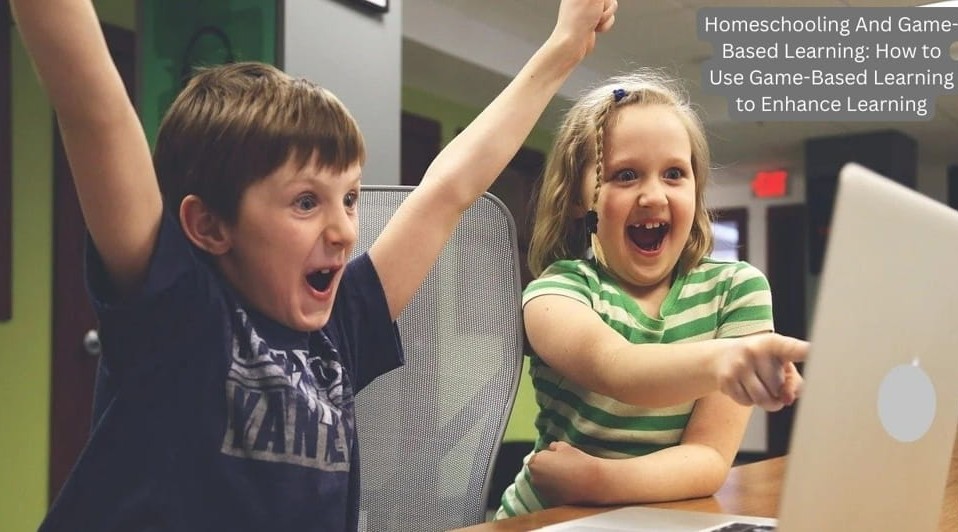
Homeschooling And Game-Based Learning: How to Use Game-Based Learning to Enhance Learning

Homeschooling And Experiential Learning: How to Use Experiential Learning to Enhance Learning

Homeschooling And Project-Based Learning: How to Use Project-Based Learning to Enhance Learning
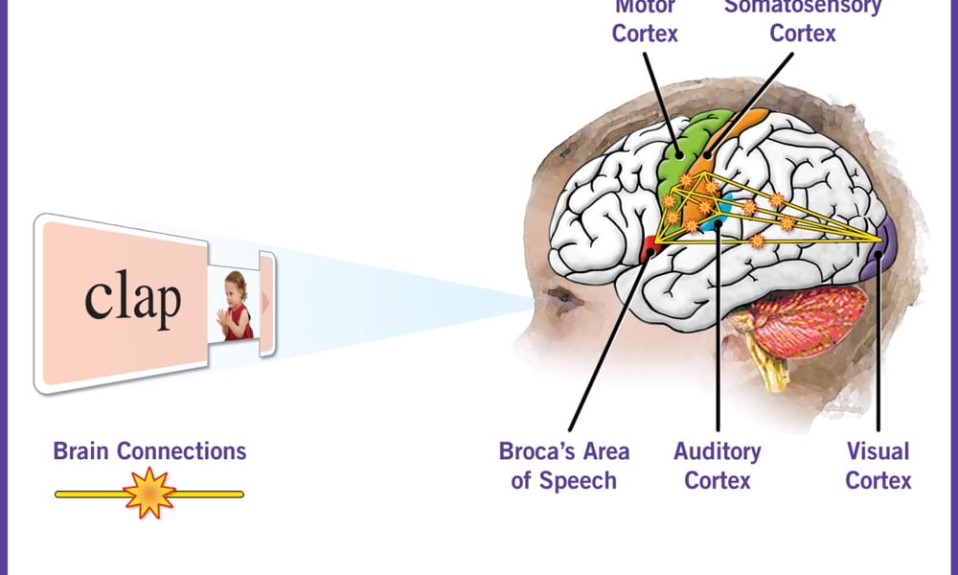
Homeschooling And Multi-Sensory Learning: How to Use Multi-Sensory Strategies to Enhance Learning

How to Choose The Right Baby Gate For Your Home
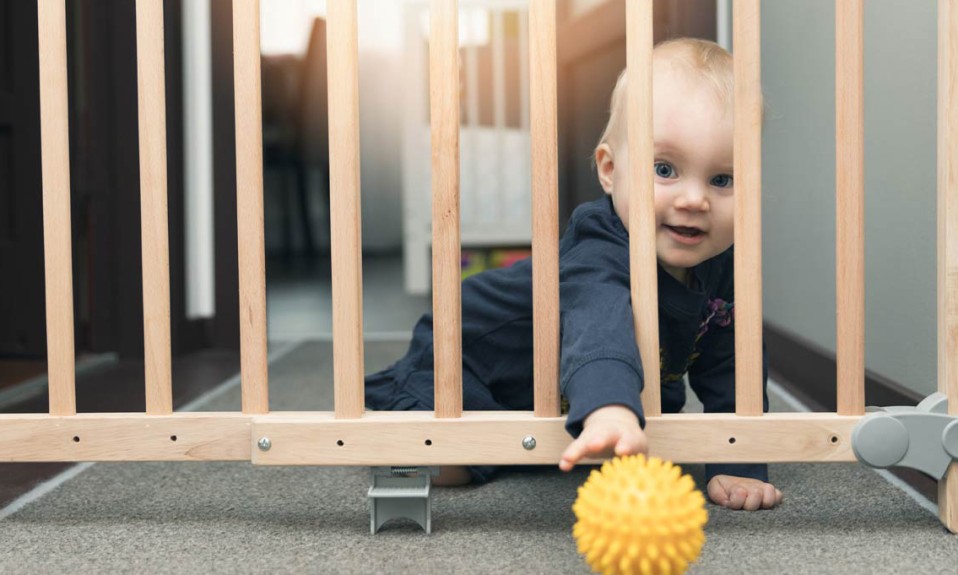
The Best Extra Wide Baby Gates For Large Openings

Baby Gate vs. Playpen: Which One is Right For You?

Baby Gate Safety: Tips For Keeping Your Child Safe
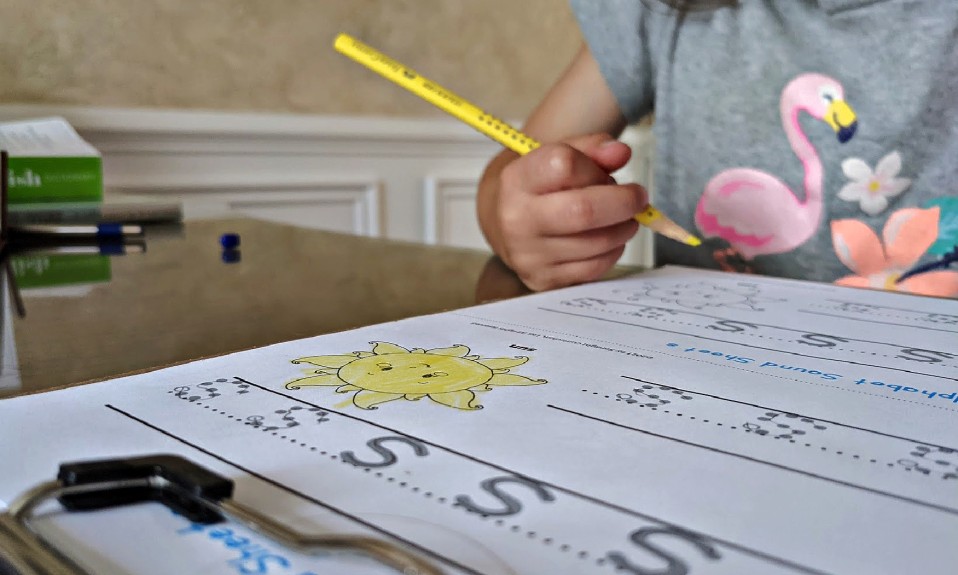
Preschool Homeschooling for Beginners

Natural Pregnancy Products For Beginners: Tips for Making the Switch

The Ultimate Guide to Choosing Baby Gates For Spiral Staircases: Features, Types, And How to Ensure Your Child’s Safety

Working Parents: How to Homeschool While Working Full-Time
Leave a reply cancel reply.
Your email address will not be published. Required fields are marked *
Save my name, email, and website in this browser for the next time I comment.
Homeschooling vs. Traditional Schooling
- May 25, 2023

Suppose you are a parent considering the best educational option for your child. In that case, you may have wondered about homeschooling versus traditional schooling. What are the benefits and drawbacks of each? How do they compare academic performance, social development, and cost? Today, you will get to know about both of these terms in detail. That will help you in choosing the best one for your child.
This EDU Blog will explore homeschooling pros and cons compared to traditional schooling.
Comparing homeschooling vs traditional schooling
Homeschooling and traditional schooling are two different ways of educating children. Homeschooling is when parents or tutors teach their children at home, using their own curriculum and resources. Traditional schooling is when children attend a school on campus, following a standardized curriculum and interacting with other students and educators.
There are advantages and disadvantages to both methods of schooling. Homeschooling can be good because children can learn what they want when they want. Parents can assist their children more . But it can be challenging because parents and children must spend time working together. Sometimes they can feel lonely or bored.
Traditional schooling can be excellent because children can make friends and enjoy fun group activities . They can also use things like libraries, labs, and gyms. But traditional education can be inadequate because children must follow the rules and do tests. Sometimes they can feel stressed or unhappy.
Some factors can help parents and children decide which way of learning is best for them. For example, what the child likes to do, how the child learns best, how much time and money the parent has, and how good the schools are near them. Homeschooling and traditional schooling are different, but both can help children develop appropriately.

Is homeschooling a good idea?
This is a question that many parents ask themselves when they are considering the best education for their children. Homeschooling pros and cons depend on various factors, such as the family situation, the learning style of the child, and the availability of resources.
Homeschooling pros and cons
Exploring the pros of homeschooling.
- Freedom: One of the main advantages of homeschooling is that it gives parents and students more freedom to choose what, when, where, and how to learn. Homeschoolers can design their own curriculum based on their interests, goals and values. They can also adjust their pace and schedule according to their needs and preferences. Homeschooling allows for more flexibility in traveling, pursuing extracurricular activities, and exploring different learning opportunities outside the classroom.
- Individualized education: Homeschooling enables parents to provide a personalized education for their child, tailored to their strengths, weaknesses, learning styles and personality . Homeschoolers can focus on the subjects and skills that are most relevant and important for them, and avoid unnecessary or boring topics. They can also learn at their own level, without being held back or pressured by peers or educators. Homeschooling can foster a love of learning and a sense of curiosity and creativity in students.
- Strong relationships: Homeschooling can strengthen the bond between parents and children, as they spend more time together and share more experiences. Parents can be more involved in their child’s education and development, and provide more guidance and support. Homeschoolers can also develop close relationships with siblings and other family members, as well as with mentors, tutors, or other homeschoolers in their community .
Exploring the cons of homeschooling
- A lot of work: Homeschooling requires a lot of time, effort, and dedication from parents. It may be stressful and exhausting for parents who are not well organized, motivated, or skilled in teaching. Parents have to plan and prepare lessons , find and purchase materials , keep records, comply with legal requirements, and monitor their child’s progress. They must also balance their work and personal responsibilities with their homeschooling duties.
- Less time for yourself: Homeschooling can leave parents with little or no time for themselves. It can be isolating and overwhelming for parents who lack support or resources. They may have to sacrifice their hobbies, interests, social life, or career goals to devote more attention to their child’s education. They may also have less opportunity to relax, recharge, or care for their health and well-being.
- Cost: Homeschooling can be expensive, depending on the type and quality of curriculum, materials, and activities parents choose for their children. Unlike public school, which is free for most families, homeschooling involves paying for books, supplies, equipment, online courses, field trips etc. Homeschooling can also reduce the income of parents who have to quit or reduce their work hours to teach their children at home.
The final verdict
Do you want to homeschool your child or send them to a regular school? This is a hard choice for many parents. Both ways have good and bad points.
Homeschooling lets you teach your child in your own way and time. You can also build a close bond with your child. But regular school helps your child make friends and learn from different educators. Your child can also utilize more tools and materials at school. Thus, it would be best to consider what your child likes and needs and what you can offer and afford.
To get more exclusive content, sign up free today at EDU Passport . You will get helpful information and advice for your child’s learning!
Top Articles
Education without borders: edu passport revolutionizes hiring .

Top 3 Key Time Management Tips for Educational Leaders

How Educators Can Prevent Bullying in Schools

Negative Effects of AI in Education Sector

3 Conflict Resolution Strategies For The Classroom

Share this article
EDU Blog is the perfect place to share your insights and experiences with the world. Apply to become a guest author today!

- EDU Impacts , EDU Talks
Transforming Mathematics Education: A Visionary Approach by Professor Matthew Yep
- March 29, 2024

Celebrating Cultural Diversity in Education: Dr. Emily Perkins Shares Insights
- March 22, 2024

Reimagining Education: A Call for Values-Based Learning
- March 15, 2024
The Effects of Homeschooling: Essay Example and Writing Tips

Introduction
Welcome to The Knowledge Nest, your ultimate source for valuable insights into various topics. In this article, we will explore the effects of homeschooling, providing you with an essay example and essential writing tips. Whether you are a student, parent, or educator, understanding how homeschooling impacts academic, social, and emotional development is crucial in making informed decisions.
What is Homeschooling?
Homeschooling refers to the practice of educating children at home, typically conducted by parents or guardians. It offers an alternative to the traditional classroom setting, allowing students to learn in a personalized and flexible environment. Homeschooling can be implemented for various reasons, such as religious beliefs, safety concerns, and dissatisfaction with traditional schooling methods.
The Academic Impact
The academic impact of homeschooling is a topic of significant interest and debate. Proponents argue that personalized instruction, tailored curriculum, and individualized pacing can lead to enhanced academic performance. Homeschooled students often have the freedom to explore their interests, which can foster a love for learning.
On the other hand, critics raise concerns about the lack of standardized testing, potential gaps in knowledge, and limited exposure to diverse educational settings. However, it is important to note that homeschooling can be supplemented with online courses, co-op classes, and community activities to address these concerns and provide a well-rounded education.
The Social Impact
One of the frequent criticisms of homeschooling revolves around the social aspect. Critics argue that homeschooled children may miss out on opportunities for social interaction and development of essential social skills. However, this perception is often misconstrued.
Homeschooled students have various avenues to engage with their peers and the community. Local homeschooling groups, extracurricular activities, and sports teams provide opportunities for socializing and collaboration. Additionally, homeschooling allows for deeper familial bonds and meaningful relationships with a diverse range of individuals by interacting with those from different age groups and backgrounds.
The Emotional Impact
The emotional impact of homeschooling is closely intertwined with academic and social development. Critics may argue that homeschooled children may experience social isolation or lack exposure to diverse opinions and perspectives, potentially hindering emotional growth.
However, homeschooling provides a nurturing environment where emotional well-being is prioritized. Students can avoid negative peer influences, bullying, and other challenges regularly found in traditional schools. Additionally, homeschooling allows flexibility in addressing individual emotional needs, promoting self-confidence, and emotional intelligence.
In conclusion, homeschooling has various effects on students' academic, social, and emotional development. While it provides personalized education and flexibility, addressing potential concerns such as standardized testing and socialization is essential. By actively participating in homeschooling communities, utilizing online resources, and engaging in extracurricular activities, homeschooled children can thrive academically, socially, and emotionally.
At The Knowledge Nest, we strive to provide you with valuable information and resources to make informed decisions. We hope this essay example and writing tips on the effects of homeschooling have been helpful to you. Stay tuned for more insightful content on a wide range of topics.

Good Topics to Write About ✏️ Essay Themes

Come Up With an Amazing Case Study Template - Studybay

How Do You Write An Argumentative Essay For Middle School

Creative Research Proposal Topics

The Jodi Huisentruit Disappearance - Creative Writing Example

How to Write an Article Review: Guide with Examples - Studybay

How to Write a Good Term Paper (Format, Structure, Outline)

Buy College Papers Online - High-Quality and Affordable

Pay For Case Study - Studybay

Derivative of Sec x: A Quick Math Tutorial

- May 24, 2022
Homeschooling vs Traditional Schooling | A comparison guide
Updated: Jun 13, 2022
I am sure you would reminisce about your childhood memories from public school. The loud old-fashioned bell ringing indicates the change of period; the constant peer pressure; the competition among your classmates for taking the first position in everything, the exam stress and anxiety, bullying, and whatnot.
But for your child, you would want them to experience their school life with minimal challenges
However, that's not possible, but there is an alternative out there. What if you enroll your child in a very advanced 360-degree holistic virtual platform , which would not only save them from a lot of challenges, bullying, and peer pressure, but will improve engagement level in studies as well.
Homeschooling or in the modern world, virtual learning has always been part of the western world. The difference is that in older times homeschooling was more based on the concept of parents teaching or tutors coming over to your home to teach your kids.
However, in modern times the concept is the same to learn at or from the confines of your home or any other place, but through the internet, the point is not to go or attend school.

According to the article published in toppr bytes currently, 2 million children are learning through homeschooling and the growth rate is around 7 to 15 percent.
Due to the pandemic and lockdown, homeschooling has taken on a lot of popularity. Since schools had closed down, so to keep the learning process alive, homeschooling was the next best option.
The pros and cons
Emotional freedom:.
Peer pressure, bullying, unhealthy competition, etc., are all part of school life. In the school environment, children tend to develop inferiority complexes for many reasons, maybe if they are studying among kids who belong to a different status quo or social class, or if your kid is weak in some areas like studies or extra-curricular activities.
Therefore, homeschooling is much better as your child has the freedom and space to breathe the way they desire. They are not obligated by their peers to do anything under their pressure.
Customize Curriculum:
Homeschooling has an advantage over traditional learning in this regard that home-based learning allows the child to learn and experience at its own pace and capability. In areas where your child is excelling can be eliminated for a while and areas where your child is weak can be focused more.
Safer Environment:
In this day and age, negative associations like getting engaged in substance use and abuse, harassment, violence, and psychological abuse are very common among teenagers. To safeguard one’s child, many parents prefer to homeschool their younger ones so that they can provide them with a much happier, calmer, and more stable emotional environment.

Close Bounding:
As time passes fast, one does not get time to spend with their loved ones. Homeschooling has given the advantage that parents and kids can spend quality time and can make memories.
Academic Accomplishment:
Homeschooled children can accomplish more in a short time compared to kids studying in school, as for them the same thing can take up to a week to get completed.
With more personal care and grooming, a home-schooled child tends to pick up more easily than at school.
Therefore, it has been noted that the quality of education is better in homeschooling than at traditional schools.
However there are some drawbacks related to at home learning.
Low Self-Confidence:
Children who are taught at home tend to be low in confidence when exposed to large crowds as they are not used to a crowded environment. This can affect their mental health.
No Social Life:
That's true, a child who has not seen a school life struggle making friends. A healthy social environment is a vital part of life. Also no social life can increase a sense of isolation within your child.
However, it all comes down to that in today's time the benefits of home learning are greater than the drawbacks. Low confidence can be boosted up by encouraging your child to take part in community events and extra curricular activities where they can also socialize themselves.
Homeschooling Advantage For Educators:
Individual pace:.
Online learning has given a huge benefit to teachers allowing them to give maximum learning curve and style to individual students. Also teachers and students together can learn at their own desirable pace and timings.
Theory Application:
In today's day and age teachers or educators have the opportunity to teach through advanced technology, which gives them the advantage of connecting the learning process with the real world examples.
Easy Access To Training:
Teachers are passionate about teaching but those educators who are teaching online have the constant need to up their game by discovery new methods and information for kids who are getting home-schooled
Customize Learning:
Since online learning is mostly a one-on-one process, teachers can easily design new courses or tailor existing learning plans according to the needs and wants of the student.
According to a report published in thinkimpact.com , as of February 2020, a total of at least 9 million Americans have gone through homeschooling at least once.
In the same report it is claimed that until 2019, the number of homeschooled students has grown by 2 to 8 percent. Also from 2019 to the fall of 2020, the percentage of the homeschooled students changed from 3.4% to 9%.

The number of households with school-aged children practicing homeschooling doubled between the Spring and Fall of 2020, according to the Census Bureau .
The states of Massachusetts and New York both saw seven-fold increases in homeschooling, while Florida showed a near tripling, and Texas, a near doubling.
On the other hand, the state of California, where homeschooling was already relatively common, saw no increase.
There are a lot of smart platforms out there who have realized that online learning/ homeschooling/ e-learning is a very significant part of the future success of the educational sector.
Therefore, platforms such as UpBrainery Technology have taken the initiative to introduce e-learning in a fun-loving way .
Also UpBrainery is giving one-on-one sessions to increase and maintain the engagement level and teacher-student learning relationship.
In the end what matters is that if your child is getting a no compromise and world class education through homeschooling then that is the best option out there for not only students but for teachers and parents as well.
For more information, visit our homeschooling hub
Happy Learning!
Recent Posts
10 Brain Exercises to help sharpen your mind and memory
Brain Booster Activities
UpBrainery's Smart-Insights Tool: A Game-Changer for Educators

IMAGES
VIDEO
COMMENTS
Higher performance: According to ThinkImpact, public school students received an average score of 21 out of 36 on the ACT, whereas homeschooled students received an average of 22.8. As for the SATs, homeschoolers scored a nationwide average of 72 points more than their traditional schooled counterparts in the United States in 2020. Safety: The ...
For most parents, traditional schooling is the norm for the society, although some have different views and prefer homeschooling. They are the best way for the future as it provides student centered education, that is adaptive to the needs of the students. This paper seeks to discuss on traditional and homeschooling, and while both have a main ...
Homeschooling affords the luxury of time flexibility, which allows for unique learning opportunities, such as field trips, real-world experiences, and extended exploration of subjects. Traditional schools operate on a fixed schedule, which may limit the time available for in-depth exploration or pursuing specific areas of interest.
In contrast, homeschooling allows for a low student-to-teacher ratio, often resulting in more individualized attention from the educator. According to the National Center for Education Statistics, the average student-to-teacher ratio in public schools is 16:1, while homeschooling often involves one-on-one instruction.
In traditional schools, teachers must cater to the needs of multiple students with various skill levels and learning abilities. On the other hand, homeschooling allows parents and tutors to design individualized instruction methods to support our child's specific strengths, weaknesses, and interests.
When deciding between homeschooling and traditional schooling, it is crucial to take these factors into consideration. 1. Homeschooling may offer limited opportunities for social interaction, potentially hindering a child's social skills and ability to form meaningful relationships with peers.
Black children who homeschool score 23 to 42 percentage points higher on standardized tests than their counterparts in public schools. On the ACT, a test used nationwide for college admissions, composite scores for homeschooled students fluctuated between 22.3 in 2007 and 22.8 in 2014. (The highest possible score is 36.)
Plus, in home-based education, all subjects are fair game, from sailing to sewing to science. Practical skills, volunteering, artistic pursuits, and traditional trades can all fall under the broad umbrella of homeschooling. According to some homeschoolers, teachable moments are always happening, and "school" isn't limited to school hours.
Challenges of Traditional Schooling. Yet, traditional schooling also presents its own set of challenges that need consideration. Limited Flexibility in Schedules and Curriculum: Traditional schools adhere to set schedules and curricula, offering less flexibility for personalized learning.; Potential for Large Class Sizes and Individual Attention: Larger class sizes can limit one-on-one ...
Homeschooling allows for flexible scheduling, personalized attention, and the freedom to tailor lessons to match your child's pace and interests. In contrast, traditional schooling follows a standardized curriculum, which may not cater to every child's specific learning requirements.
Public schools are typically less costly than homeschool curriculums. The reason why many parents can't get homeschool, even if they want to, is mostly because of the cost. It is very stressful juggling a job and children in need of an education, and it just seems simpler to send them to public school. Something that moves parents to deciding ...
The debate between homeschooling and traditional schooling has been ongoing for decades, with both sides having valid arguments. For instance, math tutors in Sydney suggest that homeschooling can be more beneficial for students who struggle in a traditional classroom setting. On the other hand, traditional schooling is seen as the norm and ...
Benefits of Homeschooling. The decision to home educate has a range of benefits when compared to traditional schooling methods. It gives the parent greater autonomy and choice over the curriculum, and the subjects studied, allowing them to focus on a preferred path of study. If the student shows particular strengths, interests,s or passion for ...
Also Read:- Importance of Internet Essay on Home Schooling in 150 words. Homeschooling is a concept that has been becoming quite popular over the years. Especially in times of natural calamities and pandemics such as COVID-19, it has gained quite a reputation for being an alternative to traditional schooling.
Homeschooling allows flexibility in scheduling, which can lead to more time spent together as a family. This can be beneficial for bonding and creating a closer-knit family unit. On the other hand, traditional schooling often means less time spent with family due to a set schedule and extracurricular activities.
According to Eggleston (2021), the rate of homeschoolers has increased. almost 6 percent in comparison to those being registered in public school from the 2019-2020. school year and the 2020-2021 school year. The research findings provided in this review will supply parents with information about.
Defining Homeschooling and Traditional Schooling. In the great debate of homeschooling versus traditional schooling, it's important to understand the fundamental principles of both education methods. In this section, we'll provide a brief overview of homeschooling and traditional schooling, as well as discuss the evolution of both approaches.
This article aims to provide an in-depth comparison of homeschooling and traditional schooling, emphasizing the importance of making an informed decision for your child's unique needs and circumstances. Homeschooling has gained popularity in recent years as an alternative to the conventional classroom setting.
Homeschooling is when parents or tutors teach their children at home, using their own curriculum and resources. Traditional schooling is when children attend a school on campus, following a standardized curriculum and interacting with other students and educators. There are advantages and disadvantages to both methods of schooling.
In conclusion, homeschooling has various effects on students' academic, social, and emotional development. While it provides personalized education and flexibility, addressing potential concerns such as standardized testing and socialization is essential. By actively participating in homeschooling communities, utilizing online resources, and ...
Homeschooling involves educating a child at home, while traditional schooling takes place in a public or private school. Both options have their pros and cons, and the decision on which to choose ...
Customize Curriculum: Homeschooling has an advantage over traditional learning in this regard that home-based learning allows the child to learn and experience at its own pace and capability. In areas where your child is excelling can be eliminated for a while and areas where your child is weak can be focused more.
Argumentative Essay: Private Schools Vs. Public Schools. Both of them require the student to have self-discipline, because they will not always involve a teacher holding him accountable. Homeschooling and cyber schooling necessitates a parent to stay home with the learner to make sure the work is accomplished.